Studying for a part-time PhD: the challenges and the benefits
A part-time phd yes, it can be done and it can be incredibly rewarding writes, arthur krebbers.


Arthur Krebbers
I’ve experienced many unexpected hurdles while doing my PhD part-time and I’m sure that you will too. It is often difficult to keep your spirits high while doing a part-time PhD but the reward is substantial.
It is also helpful to hear about other people's challenges before you embark on your own journey.
One of my biggest challenges was finding a PhD supervisor. I had contacted a professor at a well-established London business school. She seemed supportive and agreed to meet. The conversation flowed well – until I mentioned the “P-word”. “Seriously, part-time?” she said, surprised. “Look, what you are looking to do is simply impossible. I tried to oversee a part-time PhD degree, with a brilliant student. It all began very well, but after a few months they just couldn’t keep up. Too much pressure from their work.” I’d hit my first dead end.
Fortunately, after persistent searching I found an ideal match. All in all, this took about two months. I cast my net wide, reviewing the full faculty of all the top 20 European finance schools. My goal being to find those that were 1) interested in my field of study (the European debt markets) and 2) open to part-time PhD degrees. Arriving at a shortlist of supervisors, I emailed and spoke to potential supervisors until I had made a final decision. Supervisor, check!
What is a PhD? Advice for PhD students
My next hurdle was in my place of work. I had heard of managers who wouldn’t consider a degree valuable if it wasn’t chartered. And other old-school types who, on hearing about an employee’s desire to “learn more”, simply dish out extra work assignments for them. They seem to live by the attitude that they don’t need any doctors in their workplace.
I had to therefore sow the seeds carefully. My sales pitch was full of corporate-speak, linking my degree to my division’s strategic objectives and the competitive international landscape. Did you know, for instance, that two-thirds of German CEOs have a PhD? Last time I checked, their economy is doing pretty well.
With employer support in the bag, I was ready to start juggling a research degree with a professional career. I became a compulsive planner; the PhD felt like a constant guilty conscience and I always felt like I could be studying more. The bulk of my research was done on Saturdays, which I occasionally topped up during the evenings, Sundays or dedicated holidays.
My work chipped in too, granting me two weeks of research leave a year – as part of a tailor-made support agreement that I had negotiated with my managers. They became very supportive of my endeavour, with the understandable condition that my job remained my priority. Banker first, researcher second.
Despite my limited free time, I realised that moderation was important and tried to pace myself. Long bouts of study would leave me insufficiently energised for the work week or put excessive pressure on my social life.
I wasn't in a rush. Being a part-timer, I did not have the same money stresses as my full-time peers. Living expenses were paid for through the day job and tuition fees were covered by my employer. I intended to enjoy both the process and the outcome. “What is a few months delay in a lifetime anyway?”
With corporate support and sponsorship in the bag, I was ready to be initiated into the academic community. This did not happen overnight. I only had one foot in the faculty, while using the other to run the rat race. The secluded professorial life seemed idyllic, spending days researching and working. However, when I heard esteemed lecturers conferring about the “quickest ways to get to British Airways Platinum status” or the “most lucrative visiting scholar jobs” I grew disheartened.
Realising that academics were also human was an important step for me. My interaction had to go beyond just talking about my thesis. A pint and a chat about the Premier League did wonders for my research collaboration. This interpersonal approach helped to solidify my academic relationships, both with my supervisors and other researchers.
And of course you won’t just be speaking to academics day in and day out. You’ll still have to make time for socialising with your family and friends, and often they may not quite understand how a part-time PhD works.
For example, asking “what will the research be about?” can be like asking a new parent “what will your child be like when he is five years old?” The doctoral process is highly iterative – it involves constant rewriting and refocusing.
Or wanting to know “when will you be done?”. This is not too different from asking an entrepreneur “when will you raise £1 million?” It depends on many factors. Not least the opinion of the supervisor, being your gatekeeper to that gold-plated doctoral certificate.
And, crucially, it also depends on your ability to be able to overcome all these hurdles and dedicate yourself to your research.
Read more: The romance versus the reality of a PhD
You may also like

.css-185owts{overflow:hidden;max-height:54px;text-indent:0px;} 8 habits to help you get through your PhD
Shabana Khan

Pursuing a PhD in neuroscience
Luis Humberto Eudave Ramos

PhD diary: Where do I begin?
Charlie Pullen
Register free and enjoy extra benefits
The Pros and Cons of a Part-time PhD
Blog Summary
It is easier on the pocket:.
- You don't have to pause your life:
You get the flexibility:
The boundaries keep extending:, you get more time to find yourself:, the chance of it not being possible:, it is longer:, life can be disruptive:, the fear of missing out:, study phd without leaving your job.
Yes, you can pursue a PhD program part-time while working. A part-time PhD contains all the attributes and components of traditional PhD programs but comes with a flexible schedule . Notably, part-time doctoral programs are by no means easier than full-time ones. Both require effort and passion for completing.
Before you enroll in a PhD program , ask yourself, “what are the benefits of PhD degree?”, “is getting a PhD worth it?”, Let us consider the positives and negatives of part-time PhD programs.
It does not mean that part-time studies cost less than a full-time program. On the contrary, when comparing the programs’ yearly fees, part-time costs just half as much as a full-time program. But a part-time program also takes up to twice as much time as a full-time program to complete.
When you look at the amount you pay, both programs are almost equally costly. However, it is easier to pay for the part-time program as it extends over a more extended period.
You don’t have to pause your life:
When you pursue a full-time PhD, you will have to spend all your time in the program. You will not be able to work. If your life change’s personal or financial circumstances change, you will not be able to continue your PhD program.
But in the case of part-time PhD programs like from Taksha Smartlabz in association with the University of Central Nicaragua (TSL-UCN), you will be able to handle uncertainties. Moreover, you will also be able to work while on a part-time program, making it even easier.
A part-time degree does not mean you have to keep it part-time always. If you can spend more time concentrating on your doctoral program, you are free to do so. In addition, you can vary the tempo of the program to suit your needs and commitments.
Some institutions even allow you to switch to a full-time program if you can secure funding or your priorities change. You could even avail of this as your primary plan if you are initially unable to join a full-time program.
As a PhD candidate, you will be working toward extending the knowledge base of your field. When the boundaries keep expanding, opportunities keep popping up. You will get exposure to such opportunities during the course of your PhD program. Being a part of a more extended PhD program will get you higher exposure.
Because of the period of the program and the flexibility it offers, you will get time to reflect on your future. You get more time to discover the world beyond academics. You will also earn far more exposure to what the degree will offer you in the future.
PhD programs online are not easy by any means. They require effort no matter what the mode of study is. However, for some, it can be easy to handle why some might find it hard. Additionally, some fields work out better than others in the part-time mode.
If you are a student looking to fly abroad for a part-time PhD, make sure that the country you have chosen offers student visas for the program. Some countries only provide student visas for full-time PhD students.
Yes, this is a con. Although it makes it easier to pay the fees and presents more research opportunities, there are some setbacks. Your research will take longer and will sometimes be at a slower pace.
The longer duration of research could also mean that there will be higher costs involved. You should also make sure that you stay on track during the years so that you do not drift away from the program.
The feeling of being disconnected from your research is also a possibility because of the slow pace. If you plan to complete your PhD through a part-time program, you will have to set your priorities straight and give your research the attention it demands.
A part-time doctoral program may be easier to handle, along with your commitments in life and work. However, because of its longer duration, life events can be very disruptive to the program. You will have to find a way to handle the degree during setbacks in your life.
Being a part-time PhD student, you will come across full-time students too. Their academic lives will be different from yours. You will have to understand how they are able to move ahead quickly.
The people who started their PhD at the same time as you will be completing their program when you are only halfway through. They spend twice as much time as you in their academics, and they most probably do not have a work-life to handle.
The takeaway:
There are definite pros and cons to pursuing a part-time PhD program . You will have to weigh the facts and see if the lifestyle will suit you. Before you enroll, research the programs you have shortlisted and compare them.
Take into consideration money, time, effort, and other attributes before you register for the program. Even after all your research and consideration, your decision is what matters.
Register now to the PhD program of TSL-UCN to realize your dream of getting a doctorate.
Download Brochure
Select Country Afghanistan (+93) Albania (+355) Algeria (+213) American Samoa (+1-684) Andorra (+376) Angola (+244) Anguilla (+1-264) Antarctica (+672) Argentina (+54) Armenia (+374) Aruba (+297) Australia (+61) Austria (+43) Azerbaijan (+994) Bahamas (+1-242) Bahrain (+973) Bangladesh (+880) Barbados (+1-246) Belarus (+375) Belgium (+32) Belize (+501) Benin (+229) Bermuda (+1-441) Bhutan (+975) Bolivia (+591) Bosnia and Herzegovina (+387) Botswana (+267) Brazil (+55) British Indian Ocean Territory (+246) Bulgaria (+359) Burkina Faso (+226) Burundi (+257) Cambodia (+855) Cameroon (+237) Canada (+1) Cape Verde (+238) Cayman Islands (+1-345) Chad (+235) Chile (+56) China (+86) Christmas Island (+61) Colombia (+57) Comoros (+269) Cook Islands (+682) Costa Rica (+506) Croatia (+385) Cuba (+53) Cyprus (+357) Czech Republic (+420) Denmark (+45) Djibouti (+253) Dominica (+1-767) Dominican Republic (+1-809 East Timor (+670) Ecuador (+593) Egypt (+20) El Salvador (+503) Equatorial Guinea (+240) Eritrea (+291) Estonia (+372) Ethiopia (+251) Faroe Islands (+298) Fiji (+679) Finland (+358) France (+33) French Polynesia (+689) Gabon (+241) Gambia (+220) Georgia (+995) Germany (+49) Ghana (+233) Gibraltar (+350) Greece (+30) Greenland (+299) Grenada (+1-473) Guam (+1-671) Guatemala (+502) Guernsey (+44-1481) Guinea (+224) Guinea-Bissau (+245) Guyana (+592) Haiti (+509) Honduras (+504) Hong Kong (+852) Hungary (+36) Iceland (+354) India (+91) Indonesia (+62) Iraq (+964) Ireland (+353) Isle of Man (+44-1624) Israel (+972) Italy (+39) Ivory Coast (+225) Jamaica (+1-876) Japan (+81) Jersey (+44-1534) Jordan (+962) Kazakhstan (+7) Kenya (+254) Kiribati (+686) Kosovo (+383) Kuwait (+965) Kyrgyzstan (+996) Latvia (+371) Lebanon (+961) Lesotho (+266) Liberia (+231) Libya (+218) Liechtenstein (+423) Lithuania (+370) Luxembourg (+352) Madagascar (+261) Malawi (+265) Malaysia (+60) Maldives (+960) Mali (+223) Malta (+356) Marshall Islands (+692) Mauritania (+222) Mauritius (+230) Mayotte (+262) Mexico (+52) Monaco (+377) Mongolia (+976) Montenegro (+382) Montserrat (+1-664) Morocco (+212) Mozambique (+258) Namibia (+264) Nauru (+674) Nepal (+977) Netherlands (+31) New Caledonia (+687) New Zealand (+64) Nicaragua (+505) Niger (+227) Nigeria (+234) Niue (+683) Northern Mariana Islands (+1-670) Norway (+47) Oman (+968) Pakistan (+92) Palau (+680) Panama (+507) Papua New Guinea (+675) Paraguay (+595) Peru (+51) Philippines (+63) Pitcairn (+64) Poland (+48) Portugal (+351) Puerto Rico (+1-787 Qatar (+974) Romania (+40) Rwanda (+250) Saint Pierre and Miquelon (+508) Samoa (+685) San Marino (+378) Saudi Arabia (+966) Senegal (+221) Serbia (+381) Seychelles (+248) Sierra Leone (+232) Singapore (+65) Slovakia (+421) Slovenia (+386) Solomon Islands (+677) Somalia (+252) South Africa (+27) South Sudan (+211) Spain (+34) Sri Lanka (+94) Sudan (+249) Suriname (+597) Svalbard and Jan Mayen (+47) Swaziland (+268) Sweden (+46) Switzerland (+41) Syria (+963) Taiwan (+886) Tajikistan (+992) Thailand (+66) Togo (+228) Tokelau (+690) Tonga (+676) Tunisia (+216) Turkey (+90) Turkmenistan (+993) Turks and Caicos Islands (+1-649) Tuvalu (+688) Uganda (+256) Ukraine (+380) United Arab Emirates (+971) United States (+1) Uruguay (+598) Uzbekistan (+998) Vanuatu (+678) Venezuela (+58) Wallis and Futuna (+681) Western Sahara (+212) Yemen (+967) Zambia (+260) Zimbabwe (+263)
Select Category School of Public Health and Social Work School of Business Management and Public Administration School of Research School of Nursing
Select Program Ph.D in Public Health Master of Public Health Doctor of Public Health Administration
Ph.D in Management Doctor of Business Administration
Ph.D in Clinical Research
Ph.D in Nursing
Clinical Research Excellence: Murugananthan’s TAU-UCN PhD Story
Understanding the importance of public health before choosing it as a career, transform lives with public health education: your path to a healthier world, phd in public health vs. dpha: what’s the real difference, from zambia to the world: toddy sinkamba’s journey to a phd in nursing, related posts, how can a school principal perform effectively with a doctorate in education, everything you need to become a counseling psychologist, counseling psychology and its role in managing stress in older adults, be more than a librarian with a phd in library science, jump-start your educational career with a phd in education, considering a phd in education read this first.
- More Networks
A comprehensive guide to part-time PhDs
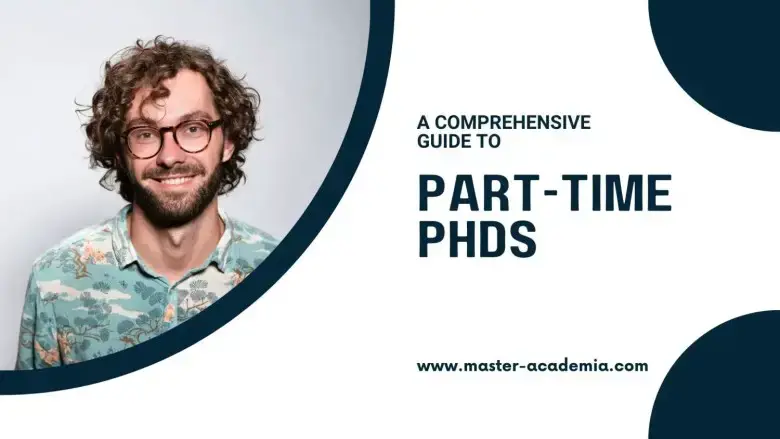
Doing a PhD part-time can be an attractive option for many reasons. However, part-time PhDs are less common than full-time ones, and there tends to be a lack of information on this option. This guide to part-time PhDs answers the most common questions that prospective part-time PhD candidates have.
The difference between a part-time and a full-time PhD
A part-time PhD carries fewer hours per week than full-time employment.
Some universities have minimum requirements for part-time PhDs, for example, a minimum of 20 hours/week. Others, however, are more flexible. They allow part-time PhD candidates to spend anything between a few hours to several days per week on their part-time PhD studies.
The degree that is awarded upon successful completion of a part-time PhD is the same as those being awarded for completing full-time programmes.
Most degree certificates don’t even mention that a PhD was pursued on a part-time basis. There is no reason to worry that a part-time PhD degree may be perceived as worth less than a full-time one.
How much work is a part-time PhD?
Part-time PhD students may be more inclined to work during evenings and weekends.
Other responsibilities during the ‘normal’ working hours result in less attention to PhD-related work. And sometimes, PhD work requires several hours of uninterrupted deep work.
How long does it take to do a PhD part-time?
In most cases, a part-time PhD takes longer than a full-time PhD. A general rule of thumb is that the fewer hours someone spends on a PhD per week, the longer it takes to complete it.
Other universities adapt to the specific circumstances of individual PhD candidates. They may allow someone to finish a part-time PhD in three years as long as all requirements are met. But they may also be okay with a part-time candidate who spends a decade on his or her PhD studies.
Where is it possible to do a PhD part-time?
There are plenty of opportunities to do a PhD part-time, but the specific opportunities and arrangements depend very much on individual universities.
There are also differences in national contexts. In some countries, for instance, in Germany, part-time PhD studies are often the norm. In Germany, many paid positions exist that encompass 60% of a full-time equivalent: time during which a PhD student is required to work in a lab or assist a professor. In the remaining 40% of the time, which is unpaid, a PhD student is expected to work on a dissertation.
Benefits of a part-time PhD
Disadvantages of a part-time phds.
There are also disadvantages and challenges in part-time PhDs. Some of the most common disadvantages of doing a PhD part-time are:
Is it worth doing a part-time PhD?
Some people embark on a PhD part-time to progress in their career. Some people hope for a financial reward after completing a PhD part-time. Some people intend to change careers and use a part-time PhD to start the process while still earning money in a different job. Some people look for a challenge and embark on a part-time PhD for self-fulfilment. Some people have no other option but to do a PhD part-time.
Skills necessary for completing a PhD part-time
Completing a PhD part-time requires several skills. These skills can be learnt. However, a complete lack of these skills at the start of a part-time PhD will make the trajectory much more challenging.
First of all, part-time PhDs benefit from a high degree of self-discipline.
Next, the ability to multi-task and keep a cool head in stressful situations is a big advantage for those who embark on a part-time PhD.
Stressing out easily and feeling easily overwhelmed with many tasks and deadlines, on the other hand, is counterproductive in a part-time PhD.
Part-time PhD students tend to wear many different hats. They need to be able to switch between different roles and juggle lots of different tasks and responsibilities.
Additionally, not everything will work according to plan. Part-time PhD students have to accept that things do not always work out as expected and have to quickly adapt to new situations.
Conditions for success in a part-time PhD
As in any PhD, regardless of whether full- or part-time, a PhD student spends many waking hours on the topic. If the topic is not interesting to the PhD student, and he or she is not passionate about it, motivation to work on it will inevitably decrease over time.
Probably even more important than the institutional environment is a good relationship between the part-time PhD student and PhD supervisors.
Pulling off a part-time PhD without all parties approving, or even knowing about it, can create a lot of problems along the way.
Online part-time PhD programmes
Proponents of these online programmes highlight how they can help to create a more level playing field . It allows PhD candidates, for instance, to live in a low-cost living area, while following a PhD at a prestigious university in a high-cost of living area.
Ten questions to ask yourself before embarking on a part-time PhD
If you consider embarking on a part-time PhD, your decision can be supported by asking (yourself) the following questions:
Master Academia
Get new content delivered directly to your inbox, public speaking in academia and how to practice it, strong academic networks through shared activities, related articles, the best answers to “what are your plans after graduation”, are doctoral summer schools for phd students worth it, all you need to know about career objectives on phd resumes, stress levels: phd versus non-academic full-time job.

Pursuing A Part-Time Phd In Computer Science: What You Need To Know
Earning a PhD is the pinnacle of academic achievement in computer science, opening doors to research, teaching, and leadership roles. But taking 4+ years off work for a full-time program isn’t feasible for everyone.
Part-time PhD options allow professionals to attain this goal while continuing their careers.
If you’re short on time, here’s the key takeaway: Part-time CS PhD programs typically take 5-7 years to complete . They provide flexibility for working students but require diligence to balance school, research, and professional demands.
The Benefits of a Part-Time CS PhD
Progress academically without leaving your job.
A part-time PhD in Computer Science offers the unique opportunity to advance your academic career while still maintaining your professional commitments. This flexibility allows you to continue working in your current job, providing financial stability and practical application of your studies.
Balancing work and study can be challenging, but the rewards are worth it. By pursuing a part-time PhD, you can deepen your knowledge in your chosen field and make significant contributions to the advancement of computer science.
Network with faculty and peers in your field
One of the key advantages of pursuing a part-time PhD in Computer Science is the opportunity to network with esteemed faculty members and like-minded peers who share your passion for the subject. Interacting with experts in the field can provide valuable insights, guidance, and collaboration opportunities.
Attending conferences, workshops, and seminars can further expand your network and expose you to the latest developments in computer science. Building these connections can open doors to new opportunities and enhance your career prospects.
Strengthen research skills and resume
A part-time PhD program allows you to develop and refine your research skills, which are highly valued in the field of computer science. Through conducting in-depth research, analyzing data, and writing scholarly papers, you can enhance your ability to critically think, problem solve, and contribute to the body of knowledge in your area of expertise.
Moreover, having a PhD in Computer Science on your resume demonstrates your dedication, perseverance, and expertise, making you a highly sought-after candidate for both academic and industry positions.
Program Structure and Requirements
Reduced course load each semester.
Pursuing a part-time PhD in Computer Science offers flexibility in terms of course load. Unlike full-time students, part-time students typically take a reduced number of courses each semester. This allows them to balance their academic commitments with other personal and professional responsibilities.
By taking fewer courses at a time, part-time students can focus on their coursework more effectively and ensure a better understanding of the material.
Original dissertation research
The cornerstone of a part-time PhD program in Computer Science is the dissertation research. Students are required to embark on an original research project under the guidance of a faculty advisor. This research should contribute to the existing body of knowledge in the field and demonstrate a deep understanding of a specific area of computer science.
The research can involve developing new algorithms, designing innovative software systems, or exploring cutting-edge technologies.
Qualifying exams and proposal defense
Part-time PhD students in Computer Science are typically required to pass qualifying exams to demonstrate their readiness for conducting research. These exams assess the student’s knowledge and understanding of the core concepts in the field.
Once the exams are passed, students need to prepare a research proposal outlining the objectives, methodology, and expected contributions of their dissertation. The proposal is then defended in front of a committee of faculty members who evaluate its feasibility and significance.
It’s important to note that the specific structure and requirements of a part-time PhD program in Computer Science may vary depending on the institution. It is advisable to consult the program’s official website or contact the program coordinator for more detailed information.
Finding the Right Program
When pursuing a part-time PhD in Computer Science, finding the right program is crucial for success. Here are some key factors to consider:
On-campus and online options
One of the first decisions to make is whether to pursue your PhD on-campus or online. On-campus programs offer the benefit of face-to-face interactions with professors and fellow students, while online programs provide flexibility for those who are working or have other commitments.
It’s important to weigh the pros and cons of each option and choose the one that aligns best with your lifestyle and goals.
Focus on faculty research expertise
Another important factor to consider when choosing a program is the faculty’s research expertise. Look for programs where the faculty members have research interests and expertise that align with your own.
This will ensure that you receive guidance and mentorship from experts in your field of interest. Additionally, professors with strong research backgrounds can provide valuable networking opportunities and connections in the industry.
Funding availability
Funding is a significant consideration for many part-time PhD students. Look for programs that offer funding options such as scholarships, grants, or assistantships. These can help alleviate the financial burden and allow you to focus on your studies.
It’s also worth exploring external funding opportunities from organizations or government agencies that support research in your field.
Managing Your Time Effectively
Stay organized with schedules and goals.
When pursuing a part-time PhD in computer science, time management becomes crucial. It is important to create a schedule that includes dedicated study hours, research time, and coursework completion. By setting goals for each week or month, you can track your progress and ensure that you are staying on track.
One effective strategy is to use a planner or a digital calendar to keep track of deadlines, meetings, and other important events. By having a visual representation of your commitments, you can prioritize your tasks and allocate time accordingly.
Additionally, breaking down larger tasks into smaller, manageable chunks can help you stay organized and prevent overwhelm. By setting realistic goals for each study session, you can make progress towards your PhD while still managing other responsibilities.
Communicate needs clearly at work
When pursuing a part-time PhD, it is essential to communicate your needs with your employer or colleagues. Letting them know about your academic commitments and the time required for your studies can help them understand your availability and make necessary adjustments.
Consider having a conversation with your supervisor or manager to discuss your situation and explore potential flexible working arrangements. This could include adjusting your work schedule, reducing your workload, or even exploring opportunities for research collaboration between your job and your PhD.
Open and honest communication can go a long way in ensuring that both your work and academic responsibilities are managed effectively.
Leverage support systems
Pursuing a part-time PhD can be challenging, but you don’t have to do it alone. It is crucial to leverage the support systems available to you.
Reach out to your academic advisor or supervisor for guidance and support. They can provide valuable insights on managing your time, selecting courses, and balancing your academic and work commitments.
Additionally, consider joining or forming study groups with fellow part-time PhD students. Collaborating with others who are facing similar challenges can provide a sense of camaraderie and support. You can share study materials, discuss research ideas, and offer each other encouragement along the way.
Lastly, don’t forget about the support of your family and friends. Let them know about your academic journey and the challenges you may face. Their understanding and encouragement can help you stay motivated and focused on your goals.
Remember, pursuing a part-time PhD in computer science requires dedication, discipline, and effective time management. By staying organized, communicating your needs, and leveraging support systems, you can successfully navigate this exciting academic journey while maintaining a balance with your work and personal life.
Completion, Careers and Next Steps
Job prospects post-phd.
Completing a part-time PhD in computer science opens up a world of exciting job prospects. With a doctoral degree in this field, you are well-equipped to pursue highly specialized positions in both industry and academia.
The demand for computer science professionals continues to grow, and obtaining a PhD can give you a competitive edge in the job market. According to the Bureau of Labor Statistics, the employment of computer and information research scientists is projected to grow 15 percent from 2019 to 2029, much faster than the average for all occupations.
This means that there will be ample opportunities for individuals with advanced degrees in computer science.
Potential teaching and research roles
One of the key benefits of earning a PhD in computer science is the opportunity to pursue teaching and research roles. Many universities and research institutions are constantly seeking experts in the field to join their faculty and contribute to cutting-edge research.
As a PhD holder, you can become a professor, teaching and mentoring the next generation of computer scientists. Additionally, you can engage in research projects, pushing the boundaries of knowledge in the field and making significant contributions to the advancement of technology.
The opportunity to share your expertise and make a lasting impact in the academic community is truly rewarding.
Higher salaries and senior positions
Earning a PhD in computer science can also lead to higher salaries and senior positions. With the advanced knowledge and skills gained during your doctoral studies, you become a valuable asset to companies and organizations.
Employers often recognize the expertise and dedication required to complete a PhD, and are willing to offer higher salaries to attract and retain top talent. In addition, holding a doctoral degree can open doors to senior management and leadership positions, where you can have a greater influence on strategic decisions and shape the direction of the company.
According to a survey conducted by the National Association of Colleges and Employers, computer science PhD graduates earned an average starting salary of $123,000 in 2020, significantly higher than those with a bachelor’s or master’s degree.
While requiring diligence and time management skills, part-time computer science PhD programs make this high-level credential attainable for busy professionals. From strengthening your research abilities to opening new career doors, the long-term benefits of earning a PhD on a flexible schedule are immense.
If you’re willing to balance work, research, and coursework, a part-time CS PhD can help you achieve your pinnacle academic and career aspirations.
Similar Posts

Does Data Science Require Math?
With the ability to extract powerful insights from complex data, data science has emerged as one of the most exciting and in-demand fields. But does embracing this data-driven future require mathematical aptitude? Let’s break down the math skills needed for data science success. If you’re short on time, here’s a quick answer: While advanced degrees…

Science In Everyday Life: 50 Examples Showing How Science Impacts Our Daily Activities
Science plays a vital role in our daily lives, even if we don’t always realize it. From the alarm that wakes us up to the phones we scroll through before bed, advancements in science, technology, engineering, and math touch every aspect of our routines. If you’re short on time, here’s a quick answer on examples…
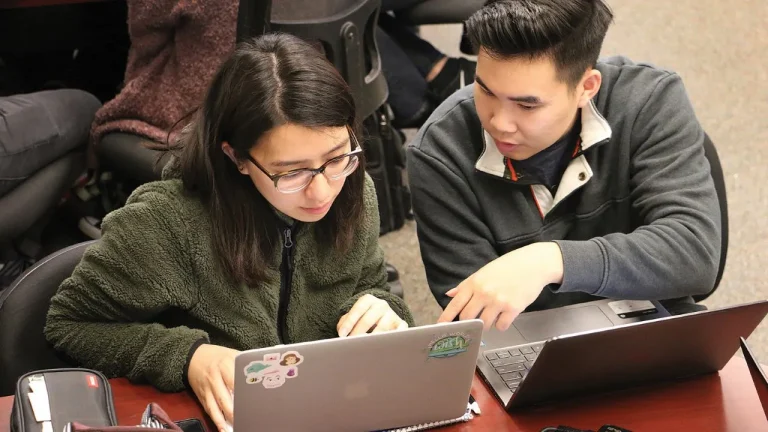
Cal Poly Slo’S Computer Science Program Ranking And Overview
If you want to know how Cal Poly SLO’s computer science program ranks nationally and the details of its curriculum, research, career outcomes, and more, you’ve come to the right overview. Cal Poly SLO is recognized as having one of the top undergraduate computer science programs in the country. In this comprehensive guide, we’ll cover…

What Grade Do You Take Forensic Science In High School?
Forensic science has become a popular class among many high school students thanks to its mix of science, logic, and criminal investigations. But in what grade can you actually take forensic science? If you’re short on time, here’s a quick answer: Most high schools offer forensic science as an elective course in 11th or 12th…

The Speed Of Light In Scientific Notation: A Closer Look
The speed of light, commonly represented by the letter c, is one of the most fundamental constants in physics. But have you ever wondered what this speed looks like expressed in scientific notation? Understanding how to write and interpret the speed of light in scientific notation provides insight into this lightning-fast universal speed limit. If…

Science Is Not A Liberal Conspiracy: Examining The Evidence-Based Nature Of Science
In today’s politically polarized climate, science has increasingly become a target of attack. Some conservative pundits and politicians have tried to paint science as a liberal agenda designed to serve left-wing ideological goals. But is there any truth to the notion that science is a partisan endeavor? Let’s examine what science fundamentally represents as a…

45,000+ students realised their study abroad dream with us. Take the first step today
Here’s your new year gift, one app for all your, study abroad needs, start your journey, track your progress, grow with the community and so much more.

Verification Code
An OTP has been sent to your registered mobile no. Please verify

Thanks for your comment !
Our team will review it before it's shown to our readers.

Studying for a Part-time PhD: The Challenges and Benefits

- Updated on
- Dec 2, 2022

Are you a Masters student or a researcher who is considering doing a PhD? If so, you would know that pursuing a doctoral program is a long-haul commitment for any student. The duration may vary by subject. A PhD in a STEM subject may take three years. On the other hand, if a PhD topic requires data collection over an extended period of time, the process can take longer.
In the Social Sciences fieldwork for qualitative data collection can take 2-3 years and so the PhD can take 5 years or a bit longer. The duration of the PhD program also varies by region. A PhD in the United States may require year-long coursework (to study and pass examinations in some specified courses). Your focused dissertation work can begin only after you pass those examinations. This is how a typical PhD program runs.
This Blog Includes:
What does a part-time phd mean, what are the benefits of doing a part-time phd, challenges faced in pursuing a part-time phd, career advice from a phd mentor.
A part-time PhD is basically about flexibility. This means that :
- The rules about timelines for submission do not apply to you.
- Time for completion may be open-ended, sometimes as long as 8 years.
- The fees may be lower than for the full-time programme.
- Your presence may not be required.
- You may be able to work remotely –in case you have a job or family responsibilities in a different city.
Many universities, regardless of the subject that you are pursuing, will offer you the option of doing a part-time PhD spread over a few years. However, if you are on a funded scholarship , or have a research fellowship or other sources of funding, this may not be permissible. You may be required to complete your dissertation within a stipulated period of time.
Must Read: Importance of publications during PhD
- If you are a young professional and holding a job, a part-time PhD would be a good option because it would give you flexibility without disrupting your professional work.
- A part-time PhD would enable a student to take up research projects and teaching assistantships alongside the study. This ensures additional income while you do your doctoral work.
- If you have family responsibilities and are not able to focus full-time on your research, then a part-time PhD offers potential.
- In case of financial constraints, the part-time PhD student will have to pay a lower fee annually, although it would extend for more years.
- Research has shown that when students take extended periods of time to finish their dissertations, many ‘drop out and do not complete their final dissertations .
- Working on the same topic for 6-8 years can result in losing focus and motivation which ends up in non-completion.
- Non-submission of the final dissertation means that the student is given the title ‘ABD’ (all but dissertation). Professionally this means that although you may have completed all other requirements, you will still be ABD and not get the title of a PhD The PhD is a key qualification required for academic and research-related positions.
- This is the reason why university fellowships have a time limit within which a student must complete and submit their dissertation and fulfil all other requirements for a PhD.
Also Read: Top Challenges Faced While Studying Abroad and How to Overcome Them
I have mentored many graduate students and PhD scholars during the years that I have taught at universities in India and in the United States. They have all confirmed that doing a PhD is hard work and needs a strong focus. My own personal journey in doing a PhD also confirmed that. I had to keep track of my own progress and create my own deadlines and targets so that every few months I could reach the next stage towards completion. In such a situation a part-time PhD did seem an attractive option. However, I chose a full-time programme to keep myself motivated and to get my degree as early as possible.
My advice is to all PhD scholars is to set a target to complete the PhD during the time permitted for a full-time PhD Choose the part-time option only if you have serious time constraints or other responsibilities or if you need to live in a different city from your university. In that case, set goals and milestones for yourself so that you don’t lose focus or motivation. For more questions on research skills, finding a topic for research or choosing a methodology, DM me!
We will be back next Friday with another amazing blog from Dr Maina Chawla Singh. Till then, if you have any questions or suggestions, just drop us a comment and we will get back to you.
Dr. Maina Chawla Singh
A scholar, internationally published author and Higher-education consultant, Maina Chawla Singh (PhD) has over 25 years of teaching experience at universities in India, United States and Israel. She has authored two academic books and several peer-reviewed journal articles. Her research spans multiple disciplines across Liberal Arts : Gender Studies, Colonialism, History of Medicine, Migration, Identity Studies, Indian Diaspora, Jewish Anthropology and Israel Studies. Dr Singh has been an invited speaker at prestigious institutions including at Yale, Cornell, Oxford, Georgetown, University of Penn, Emory University, Ann Arbor, Michigan, NYU, Tel Aviv University (Israel) and Sciences Po (France). Having taught online university courses at American University since 2013, Dr Singh is highly skilled in Digital Pedagogies, Syllabus Design and Online teaching. She has been a peer-reviewer for several international journals and is certified in academic manuscript editing (New York university, USA). Dr Singh has lived in Russia, Israel, Japan, Ethiopia, France and the USA and has a deep comparative understanding of International Education. She is passionate about supporting student aspirations for Study Abroad. Dr Singh is an Academic Content Creator. As a freelance mentor Dr Singh offers customized career-advice to students, early- career professionals and researchers for Personal Brand-building ; Persuasive Communication, Academic Profile-building and Research Publication. Dr Singh speaks Hindi, English, Punjabi and Russian. She loves reading about Tech, Digital Marketing and Design-Thinking.
Leave a Reply Cancel reply
Save my name, email, and website in this browser for the next time I comment.
Contact no. *

Leaving already?
8 Universities with higher ROI than IITs and IIMs
Grab this one-time opportunity to download this ebook
Connect With Us
45,000+ students realised their study abroad dream with us. take the first step today..

Resend OTP in

Need help with?
Study abroad.
UK, Canada, US & More
IELTS, GRE, GMAT & More
Scholarship, Loans & Forex
Country Preference
New Zealand
Which English test are you planning to take?
Which academic test are you planning to take.
Not Sure yet
When are you planning to take the exam?
Already booked my exam slot
Within 2 Months
Want to learn about the test
Which Degree do you wish to pursue?
When do you want to start studying abroad.
September 2024
January 2025
What is your budget to study abroad?

How would you describe this article ?
Please rate this article
We would like to hear more.
25 Best Part Time PhD Programs [2024 Guide]
Explore part time PhD programs. Compare schools and see why you should consider earning your doctorate part time.

If work or other responsibilities have been holding you back from diving headfirst into doctoral studies, consider part time PhD programs instead.
Editorial Listing ShortCode:
You may enroll in an on-campus or online PhD program to earn your doctoral credentials on a schedule that fits your busy lifestyle.
Universities Offering PhD and Other Doctorate Programs Online
Methodology: The following school list is in alphabetical order. To be included, a college or university must be regionally accredited and offer degree programs online or in a hybrid format.
1. Andrews University
Andrews University is a private university in Berrien Springs, Michigan, that is affiliated with the Seventh-day Adventist Church. Founded in 1874, Andrews has a current annual enrollment of 3,366.
Students can pursue 130 undergraduate and 70 graduate majors across eight schools and colleges. Degrees at the bachelor’s, master’s, and doctoral levels are available.
- PhD in Curriculum and Instruction
- PhD in Educational Leadership
- PhD in Higher Education Administration
- PhD in Leadership
Andrews University is accredited by the Higher Learning Commission.
2. Clemson University
Clemson University is a public research university located in Clemson, South Carolina. Founded in 1889, Clemson boasts an annual student enrollment nearing 30,000. U.S. News & World Report ranks Clemson University in 24th place among all public universities.
Students can pursue bachelor’s, master’s, and doctoral degrees across Clemson’s seven schools and colleges.
- PhD in Healthcare Genetics
- PhD in Parks, Recreation and Tourism Management
- PhD in Rhetorics, Communication and Information Design
Clemson University is accredited by the Southern Association of Colleges and Schools Commission on Colleges.
3. George Washington University
Chartered in 1821 by an act of the United States Congress, George Washington University stands today as a private research university with an annual enrollment of more than 27,000. GWU is divided into 14 colleges and schools offering bachelor’s, master’s, and doctoral programs.
The Princeton Review consistently ranks George Washington University as a top college in a number of categories. In addition, GWU has been ranked as one of the Top Universities for Producing Billionaires by the Times Higher Education’s World University Rankings.
- PhD in Nursing
- PhD in Systems Engineering
GW is regionally accredited by the Middle States Commission on Higher Education.
4. Hampton University
Hampton University is a private, historically black university located in Hampton, Virginia, that was founded in 1868. The university is comprised of 10 accredited schools and colleges offering 50 bachelor’s programs, 26 master’s programs, and seven doctoral programs. The Alumni Factor has named Hampton one of the best colleges in Virginia.
- PhD in Business Administration
- PhD in Educational Management
Hampton University is accredited by the Commission on Colleges of the Southern Association of Colleges and Schools.
5. Indiana State University
Indiana State University is a public university located in Terre Haute, Indiana, with a history dating back to 1865. ISU offers more than 100 undergraduate majors and 75 graduate. Students can pursue 20 bachelor’s degrees, 22 master’s degrees, and seven doctoral degrees on campus and online through ISU’s six academic colleges.
- PhD in Educational Administration – Higher Education Leadership
- PhD in Educational Administration – School Administration
- PhD in Technology Management
Indiana State University is accredited by the Higher Learning Commission.
6. Keiser University
Keiser University is a private university based in Fort Lauderdale, Florida. Founded in 1977, Keiser offers bachelor’s, master’s, and doctoral programs available both on campus and online. Money magazine has rated Keiser University one of the top colleges for the money in Florida. Nearly 20,000 students study at Keiser.
- PhD in Criminal Justice and Criminology
- PhD in Industrial and Organizational Psychology
- PhD in Instructional Design and Technology
Keiser University is accredited by the Southern Association of Colleges and Schools Commission on Colleges.
7. Liberty University
Liberty University is a private evangelical Christian university founded in Lynchburg, Virginia, in 1971. The school consists of 17 distinct colleges offering a wide variety of bachelor’s, master’s, and doctoral programs. Programs are divided between 366 on-campus options and 280 online options.
- PhD in Bible Exposition
- PhD in Communication
- PhD in Criminal Justice
- PhD in Criminal Justice – Homeland Security
- PhD in Criminal Justice – Leadership
- PhD in Education – Curriculum and Instruction
- PhD in Education – Instructional Design and Technology
- PhD in Education – Organizational Leadership
- PhD in Education – Special Education
- PhD in Higher Education Administration – Educational Leadership
- PhD in History
- PhD in Nursing – Nursing Education
- PhD in Psychology – Developmental Psychology
- PhD in Psychology – Industrial/Organizational Psychology
- PhD in Psychology – Social Psychology
- PhD in Public Policy
- PhD in Public Policy – Economic Policy
- PhD in Public Policy – Education Policy
- PhD in Public Policy – Foreign Policy
- PhD in Public Policy – National Security
- PhD in Public Policy – Social Policy
- PhD in Strategic Media
- PhD in Theology and Apologetics
Liberty University is accredited by the Southern Association of Colleges and Schools Commission on Colleges.
8. Mississippi State University
Mississippi State University is a public research university located near Starkville, Mississippi, that is classified among RI Doctoral Universities for very high research activity. MSU’s more than 22,000 enrolled students can pursue more than 180 areas of study for bachelor’s, master’s, and doctoral degrees. The school was founded in 1878.
- PhD in Community College Leadership
- PhD in Computational Engineering
- PhD in Electrical and Computer Engineering
- PhD in Engineering – Aerospace Engineering
- PhD in Engineering – Civil Engineering
- PhD in Engineering – Mechanical Engineering
- PhD in Industrial & Systems Engineering
Mississippi State University is accredited by the Southern Association of Colleges and Schools Commission on Colleges.
9. North Carolina A&T State University
North Carolina Agricultural and Technical State University is a public, historically black university located in Greensboro, North Carolina. The school was founded in 1891 by the North Carolina General Assembly. It is ranked among the top historically black colleges and universities (HBCUs) by U.S. News & World Report.
A total of 54 bachelor’s, 29 master’s, and nine doctoral degrees are offered through the school’s eight colleges.
- PhD in Leadership Studies
North Carolina Agricultural and Technical State University is accredited by the Southern Association of Colleges and Schools Commission on Colleges.
10. Texas Tech University
Established in 1923, Texas Tech University is a public research university in Lubbock, Texas, featuring 13 colleges and 60 research centers. The Princeton Review has ranked Texas Tech among the 125 best colleges in the Western United States.
Texas Tech offers 150 options for bachelor’s degrees, 110 options for master’s degrees, and 59 doctoral degree programs.
- PhD in Curriculum and Instructions – Curriculum Studies and Teacher Education
- PhD in Curriculum and Instructions – Language, Diversity & Literacy Studies
- PhD in Curriculum and Instructions – STEM
- PhD in Educational Leadership Policy
- PhD in Family and Consumer Science Education
- PhD in Special Education
Texas Tech University is accredited with the Southern Association of Colleges and Schools Commission on Colleges.
11. University at Buffalo
Founded in 1846, the University at Buffalo a public research university with campuses in Buffalo and Amherst, New York. Nearly 32,000 students are enrolled in what is considered to be the largest public university in New York. UB offers bachelor’s, master’s, and doctoral degrees across 13 academic schools and colleges.
- PhD in Information Science
The University at Buffalo is accredited by the Middle States Commission on Higher Education.
12. University of Alabama – Huntsville
The University of Alabama in Huntsville was founded in 1950. It is one of three members of the University of Alabama System. UAH school awards 44 bachelor’s, 30 master’s and 15 doctoral degrees across nine colleges to a study body of nearly 10,000.
UAH is a space-grant university with a large focus on engineering and science programs.
- PhD in Civil Engineering
- PhD in Engineering Management
- PhD in Industrial Engineering
- PhD in Joint Nursing Science
UAH is accredited by the Southern Association of Colleges and Schools Commission on Colleges.
13. University of Colorado – Denver
A member of the University of Colorado system, the University of Colorado Denver is a public research facility offering hundreds of degree programs for bachelor’s, master’s, and doctoral studies across dozens schools and colleges.
Total annual enrollment stands at 24,910. Forbes places the University of Colorado Denver 34th on the its list of best public colleges.
University of Colorado – Denver is accredited by the Higher Learning Commission.
14. University of Florida
The University of Florida is a public land-grant, sea-grant, and space-grant research university with a main campus in Gainesville, Florida. This senior member of the State University System of Florida offers bachelor’s, master’s, and doctoral programs to the more than 56,000 students that enroll annually.
The list of notable UF alumni includes Erin Andrews, Emmitt Smith, Faye Dunaway, and Marc Rubio.
- PhD in Classical Civilization
- PhD in Latin and Roman Studies
The University of Florida is regionally accredited by the Southern Association of Colleges and Schools.
15. University of Kansas
The University of Kansas is a public research university based in Lawrence, Kansas. Founded in 1865, KU offers more than 345 degree programs for bachelor’s, master’s, and doctoral studies. KU has an annual enrollment of more than 28,400 students.
The school’s faculty and alumni list includes four NASA astronauts, seven Pulitzer Prize winners, 27 Rhodes Scholars, and 325 Fulbright Scholars.
The University of Kansas is accredited by the Higher Learning Commission.
16. University of Missouri
The University of Missouri was founded in 1839 as the flagship of the University of Missouri System. Mizzou currently offers more than 300 bachelor’s, master’s, and doctoral degree programs across 13 major academic divisions for its more than 30,000 enrolled students.
- PhD in Architectural Studies
The University of Missouri is accredited by the Higher Learning Commission.
17. University of North Carolina – Greensboro
The University of North Carolina at Greensboro is a public research university located in Greensboro, North Carolina, that dates back to 1891. This school with an annual enrollment topping 20,000 is part of the University of North Carolina system.
More than 100 bachelor’s, 61 master’s, and 26 doctoral programs are offered at UNCG.
The University of North Carolina at Greensboro is accredited by the Southern Association of Colleges and Schools Commission on Colleges.
18. University of North Dakota
Located in Grand Forks, the University of North Dakota offers 90 bachelor’s majors, 54 master’s programs, and 27 doctoral programs. UND was founded in 1883. Currently, UND has an annual enrollment of 13,581 students spread across its 10 academic divisions. The school’s athletic teams compete in the NCAA’s Division I.
- PhD in Aerospace Sciences
- PhD in Biomedical Engineering
- PhD in Chemical Engineering
- PhD in Electrical Engineering
- PhD in Energy Engineering
- PhD in Environmental Engineering
- PhD in Indigenous Health
- PhD in Petroleum Engineering
The University of North Dakota is accredited by the Higher Learning Commission of the North Central Association of Colleges and Schools.
19. University of South Carolina
The University of South Carolina is a public research university located in Columbia, South Carolina. The more than 35,000 students enrolled at USC today can study toward bachelor’s, master’s, and doctoral degrees from 14 degree-granting colleges and schools. The school’s history dates back to 1801.
- PhD in Computer Engineering
- PhD in Computer Science
- PhD in Mechanical Engineering
- PhD in Nuclear Engineering
University of South Carolina is accredited by the Southern Association of Colleges and Schools Commission on Colleges.
20. University of South Dakota
The University of South Dakota is a public research university in Vermillion, South Dakota, with an enrollment of nearly 10,000 students. The university is divided between seven colleges offering hundreds of bachelor’s, master’s, and doctoral degrees. USD’s campus is home to the National Music Museum. The school was founded in 1862.
- PhD in Health Sciences
USD is accredited by the North Central Association of Colleges and Secondary Schools.
21. University of Southern Mississippi
The University of Southern Mississippi is a public research university with a main campus located in Hattiesburg, Mississippi. Southern Miss awards bachelor’s, master’s, and doctoral degrees across more than 189 programs. Founded in 1910, the school boasts an annual enrollment of more than 14,00 students.
Southern Mississippi’s academic offerings are divided across four colleges and schools.
- PhD in Nursing Leadership
The University of Southern Mississippi is accredited by the Southern Association of Colleges and Schools Commission on Colleges.
22. University of Tennessee – Knoxville
Founded in 1794, the University of Tennessee is a public research university located in Knoxville, Tennessee. UT offers bachelor’s, master’s, and doctoral degrees across 10 undergraduate colleges and eleven graduate colleges. Annual enrollment stands at close to 29,000 students.
Established two years before Tennessee officially became a state, the University of Tennessee is one of the oldest public universities in the country.
- PhD in Industrial and Systems Engineering – Engineering Management
The University of Tennessee – Knoxville is accredited by the Southern Association of Colleges and Schools Commission on Colleges.
23. University of the Cumberlands
The University of the Cumberlands is a private university located in Williamsburg, Kentucky, dating back to 1888. Bachelor’s, master’s, and doctoral programs in a variety of specialties in the arts and sciences are offered across four colleges. Total annual enrollment is 13,476.
University of the Cumberlands is accredited by the Southern Association of Colleges and Schools Commission on Colleges.
24. Virginia Commonwealth University
Virginia Commonwealth University is a public research university located in Richmond, Virginia, with a history dating back to 1838. VCU offers more than 217 programs for bachelor’s, master’s, and doctoral degrees across 11 schools and three colleges.
U.S. News & World Report has classified VCU as a Tier 1 University that ranks in 84th place among all public colleges and universities in the United States.
- PhD in Health Related Sciences
VCU is accredited by the Southern Association of Colleges and Schools Commission on Colleges.
25. West Virginia University
Founded in 1875, West Virginia University is a public research university with a main campus in Morgantown, West Virginia. More than 350 academic programs for bachelor’s, master’s, doctoral, and professional degrees are offered through 14 schools and colleges for the nearly 30,000 students who enroll at WVU annually.
Designated among the R1 Research Universities for very high research activity, WVU boasts research partnerships with the Rockefeller Neurosciences Institute and the Federal Bureau of Investigation.
West Virginia University is accredited by the Higher Learning Commission.
Do Part Time PhD Programs Exist?

Yes, part time PhD programs do exist. Universities know that many people have packed schedules. To accommodate busy students, some schools give the option of part-time enrollment in PhD programs online or on-campus.
The idea is that you may work your way through one of these programs while still living at home and holding a regular job — no uprooting your life required.
Many part-time PhD programs are offered online, which can be particularly convenient. Online college allows you to attend the university of your choice without having to move away from your hometown.
You may take classes online, chat digitally with your academic advisors, and work on your dissertation from the comfort of your own home. Even still, there may be some in-person residencies or practicums required.

Finances are one of the best reasons to enroll in a part-time online program. The paycheck that you bring in each week can help you afford your grad school tuition without living on ramen noodles for five years straight.
Of course, being able to hold a full-time job while going through your doctoral program is more than just a way to make money. Particularly if your field of study is relevant to your job, you may find many opportunities to connect your classroom studies to real-world experiences.
It’s even possible that a situation at work may provide inspiration for the topic of your doctoral dissertation. If you feel that a dissertation may prevent you from finishing your PhD, then a professional doctorate may be a better choice.
For example, doctor of education programs don’t require dissertations in many cases. Instead, students may complete a final capstone project to demonstrate subject mastery.
Part-time students don’t make up the majority of doctoral candidates; even still, you certainly won’t be the only one if you choose to go this route. In the past year, approximately 44% of doctoral students were enrolled in part-time programs .
What Are the Most Popular PhD Programs?
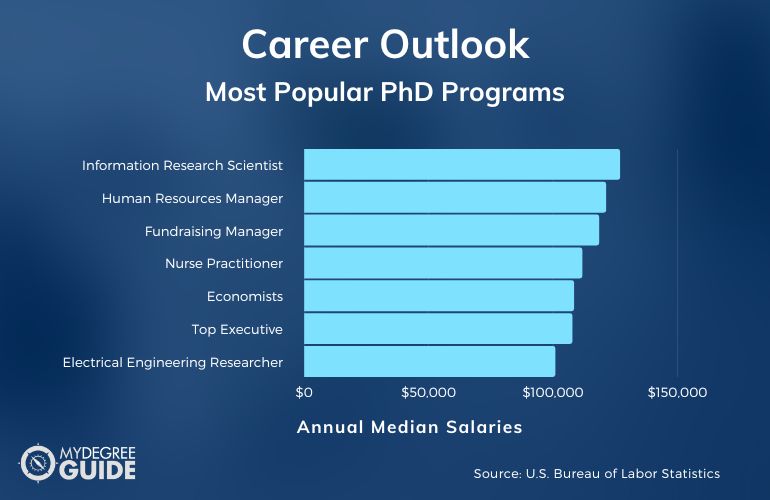
Doctorates are available in practically any field, but some are more common than others. The following table shows some of the top PhDs that you may be able to earn online.
According to the Bureau of Labor Statistics, some related careers and their average salaries include:
| Information Research Scientist | $126,830 |
| Human Resources Manager | $121,220 |
| Fundraising Manager | $118,430 |
| Nurse Practitioner | $111,680 |
| Economist | $108,350 |
| Top Executive | $107,680 |
| Electrical Engineering Researcher | $100,830 |
| School Principal | $98,490 |
| Postsecondary Education Administrator | $97,500 |
| Clinical Psychologist | $82,180 |
| Epidemiologist | $74,560 |
Getting your doctorate may certainly increase your earning potential. According to the Bureau of Labor Statistics, the median annual salary for PhDs is $110,200. That’s a large jump from $78,210, the average annual earnings for those with a master’s degree.
How Do Part Time PhD Degree Programs Work?

To graduate from a part-time doctoral program, you’ll need to do the same work that you would for a full-time course of study. You’ll simply spread the work out over a longer stretch of time.
The first portion of your program will likely be devoted to classes. If you’re enrolled on a part-time basis, you’ll probably keep your course load light instead of taking multiple classes at once.
You may be able to take the classes online, but your school may require a few in-person residencies as well.
Some classes will focus on the research methods that are essential for all doctoral candidates to know, such as analyzing data and writing scholarly reports. At this point, you may also start thinking about a topic for your upcoming research project.

Other courses will be related to your field of study. While some classes may be required of every student in your PhD department, others may be electives. That way, you may build a course of study that is tailored to your career goals and research interests.
After completing your classes, your school may require oral or written testing as a way of assessing your knowledge.
Next, you’ll turn your attention toward your dissertation or another final project. This usually requires completing original research and reporting your findings in a detailed paper.
Even for full-time students, it may take several years to complete a dissertation. On a part-time basis, you may be working on this project even longer.
Once you finish your dissertation, the school’s faculty will need to approve it. Then, you’ll answer questions during a defense of your research. If the faculty determines that you have successfully defended your dissertation, you’ll then be awarded your PhD.
How Long Does It Take to Do a PhD Part Time?

How long it takes to complete your PhD through a part-time schedule is largely up to you and how much you can commit to your studies at any point in time.
You may find that there are some seasons in which you’re able to invest a good portion of your time and other seasons when you’re only able to do the bare minimum to keep going.
As a general rule, though, you should expect your part-time studies to last for several years. Being a part-time student won’t exempt you from any of the program’s requirements.
You’ll still need to earn just as many credit hours, complete any residency or internship experiences, and do the same final projects. The work will just be spread out over a longer period of time.

You should probably plan to work on your doctoral program for six to eight years. Some students take even longer. There may be a maximum duration allowed by your program, so be sure to discuss that with your faculty advisor.
Although part-time schooling is convenient, being enrolled in the same program for years on end may start to feel tedious. It’s important to choose an area of study that you really care about.
Your passion for your studies can keep you motivated even when graduation still seems a long way off.
Admission Requirements for a PhD

No matter what type of doctoral program it is, whether it is a part time or an online accelerated doctoral program , they can be competitive and you’ll want to make sure that your application stands out to the admissions committee. The first step is making sure that you meet the requirements and include all necessary documentation.
- Application and fee: Filling out this form gives the committee basic information about you, so be sure to complete it thoroughly. The fee will be non-refundable, even if you aren’t admitted.
- College transcripts: These demonstrate whether you have the appropriate academic background. You will need to hold a bachelor’s degree, and you may need a master’s degree as well. There may be minimum GPA scores required.
- Test scores: Many schools use GRE or GMAT scores to determine whether you have what it takes to succeed in a PhD program. If you’re an international applicant, you may also need TOEFL scores to demonstrate your proficiency with the English language.
- Letters of reference: These should come from academic or professional colleagues who can attest to your commitment and character. Two or three letters may be required.
- Personal statement or research proposal: This is your chance to communicate your study goals. That way, the school can determine whether your interests align with the expertise of the faculty.
Pay close attention to application deadlines. It’s smart to submit your materials a few weeks before the cutoff since schools don’t usually take late applications.
Accreditation for PhD Programs

Accreditation is a process in which an independent organization evaluates a college’s programs and results to determine whether the school is doing a good job of educating students. If the college is up to par, then it receives approval from an accrediting body.
The primary type of accreditation to consider is regional accreditation . There are seven U.S. organizations that have the right to grant regional accreditation.
There are fairly high standards for regional accreditation. As a result, this type of accreditation is well-respected, and employers are often more inclined to select candidates whose degrees come from regionally accredited schools.
Financial Aid for PhD Students

Paying for a doctorate out of pocket can be an overwhelming prospect, but there are a number of options for funding your PhD.
- Fellowships: Based on your personal merits, your school or a private organization may give you fellowship money intended to further your research goals.
- Government grants: If your income qualifies, you may get free tuition help from the state or federal government.
- Government loans: You may have the option to take out low-interest loans from the federal government or your state.
- Private loans: To supplement your financial package, you may also need private loans. Just be aware that these can come with high interest rates.
- Scholarships: You can apply for gift money from a scholarship-granting organization, such as a professional association in your field.
- Stipends: Some schools grant PhD candidates a small stipend. There are usually stipulations to this, and the rules may differ for part-time students.
To find out more, talk to your school’s financial aid department. Be sure to fill out the Free Application for Federal Student Aid (FAFSA) .
Also, if getting a doctorate could benefit your performance at work, you may be able to request tuition assistance from your employer.
Can You Do PhD Part Time?

Yes, you can do a PhD part time. Studying for a PhD doesn’t have to be all-or-nothing. Just as there are part time masters programs , you can likewise enroll in a doctoral program on a part-time basis.
With that approach, you may be able to go to work during the day and take classes or write papers in the evening. It may even be possible to complete the coursework online.
Is PhD Full Time or Part Time?
Both full-time and part-time PhD programs are available. Some people choose to earn their doctorates as quickly as possible by going to school full-time. Others opt to enroll part-time so that they may keep up with work or family responsibilities.
Keep in mind that not all schools give you the choice between full-time and part-time study; their traditional or online doctoral programs may be specifically designed for one or the other.
Is a PhD Worth It?

Yes, a PhD is worth it for many students. The U.S. Bureau of Labor Statistics projected a 5.9% job growth for doctoral or professional degree holders over the next 1o years, faster than the average for all occupations.
Getting a PhD may open new doors. Earning this top degree may grant you entrance into academia as a researcher or a professor.
It may also prepare you to assume high leadership roles and earn more money in your field. Plus, there’s often a sense of personal satisfaction that comes from accomplishing a huge goal like earning a PhD.
If you’re ready to put those three letters after your name, then it’s time to think about enrolling in a doctoral program. Apply to part-time PhD programs so you may pursue your degree without putting your life on hold.


Can You Do A PhD Part Time? Best Part Time PhD Programs
For many, the opportunity to study for PhD may come at a time when many other commitments have started to enter their lives – career, family, children, and more. You could be one of them. Question is however, can you do a PhD part time?
You can do a PhD part time. Part-time PhD programs are usually designed to be more flexible, and gives more time for you to complete your dissertation. It could take up to 10 years to complete a part time Ph.D.
In this post, we explore if you can do your PhD part time. We also look into:
- How part time PhD programs differ from full time ones,
- The pros and cons of part time PhD,
- Some of the best part-time PhD programs in the US, and
Can You Do A PhD Part Time?
If you are juggling a full-time job or other significant commitments, here’s a good news – you can do a PhD part time.
These programs offer the flexibility to merge professional pursuits with academic rigor, a boon for working professionals aiming to ascend in their field of study without pausing their careers.
Part-time PhD programs are not a diluted version of their full-time counterparts; they demand the same level of intensity and depth, particularly when it comes to the dissertation phase.
The primary difference lies in the time it takes to complete your degree. While a full-time PhD might take anywhere from 3 to 5 years, part-time PhDs can extend up to 7 or more, contingent on your pace and time management skills.
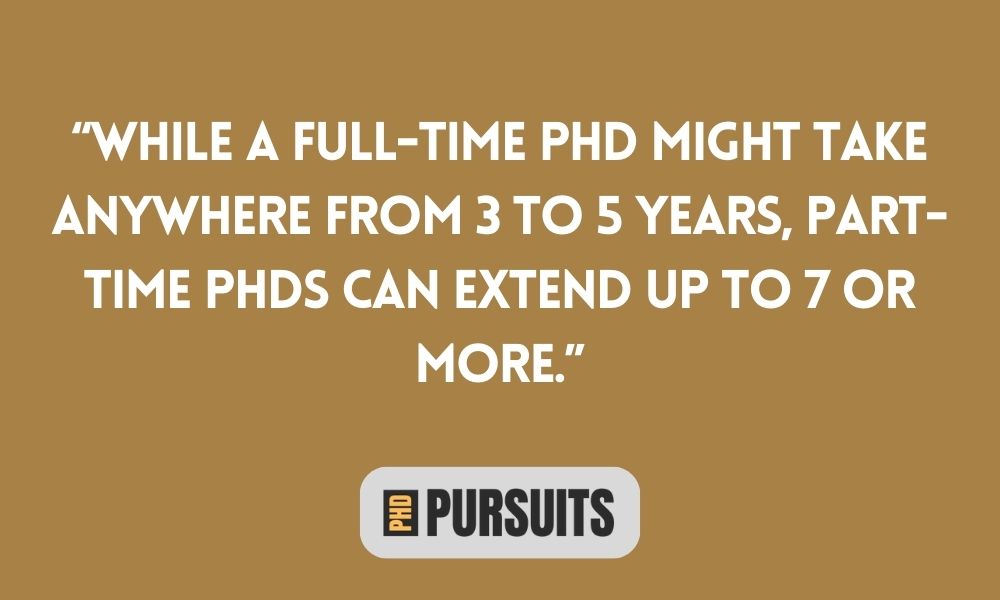
Institutions that offers these programs understand that part-time PhD students must navigate the dual demands of work and study. These students often requiring adept time management and a supportive network, including an understanding PhD supervisor.
How Does Part Time PhD Programs Work ?
Part-time PhD programs are tailored for those who balance a full-time job or other life commitments with their academic aspirations.
These programs are designed with flexibility in mind, allowing you to progress through your doctoral journey without forsaking your professional or personal responsibilities. This means many part-time PhD students can study in a structure that accommodates their busy schedules.
Classes might be offered in the evenings or on weekends, and many programs leverage online platforms to deliver coursework, making it easier for you to engage from anywhere.
A part-time PhD student typically takes fewer courses each semester compared to their full-time counterparts. This reduced course load extends the time it takes to complete the degree.
The pace is slower, but the standards remain high. You’re expected to produce a dissertation that contributes new knowledge to your field of study, just like in a full-time program.
Financial aid and scholarships are crucial for many part-time PhD candidates. Universities offer part-time students various forms of support, understanding the financial strain of:
- juggling a job,
- life’s expenses, and
- tuition fees.
How Long Does It Take To Complete Part Time PhD?
Typically, a part-time PhD program stretches over a longer period than its full-time counterpart, largely due to the reduced hours a part-time student can dedicate weekly to their studies and research.
On average, part-time PhD students may take anywhere from 5 to 10 years to complete their doctoral degree, compared to 3 to 5 years for a full-time PhD.
This extended timeline is a reflection of the juggling act that part-time students perform, dividing their focus between academia and other life responsibilities.
The flexibility of part-time programs allows you to maintain your professional career and personal life while pursuing your doctorate, a key advantage that attracts many to this route.
Whats The Differences Between Part-time And Full-Time PhD?
One of the most noticeable differences is the time it takes to complete your degree. A full-time PhD typically spans 3 to 5 years, depending on the field of study and institution.
In contrast, part-time PhDs can extend up to 7 or even 10 years. This is because they are more flexible, catering to part-time students by allowing extended timelines for dissertation completion.
Schedule Flexibility
Part-time PhD programs are designed with working professionals in mind.
This means classes might be scheduled during evenings or weekends, and there’s often a significant portion of the program that can be completed online.
Full-time PhD students, however, are usually expected to adhere to a more traditional daytime schedule and may spend more time on campus engaged in research and teaching assistantships.
Financial Aid and Scholarships
While both part-time and full-time PhD students have access to financial aid and scholarships, the nature and amount might differ.
Full-time students often receive more comprehensive funding packages, which can include tuition waivers and stipends for teaching or research assistantships.
Part-time students may have access to financial aid but often rely more heavily on external funding, employer tuition assistance, or personal finances.
Academic and Professional Engagement
Full-time PhD students typically immerse themselves in academia, engaging in their studies in a higher pace and intensity compared to their part-time counterparts. These activities include:
- attending conferences, and
- contributing to publications.
Part-time PhD students, balancing a job and academic responsibilities, might find it challenging to engage at the same level without robust time management skills.
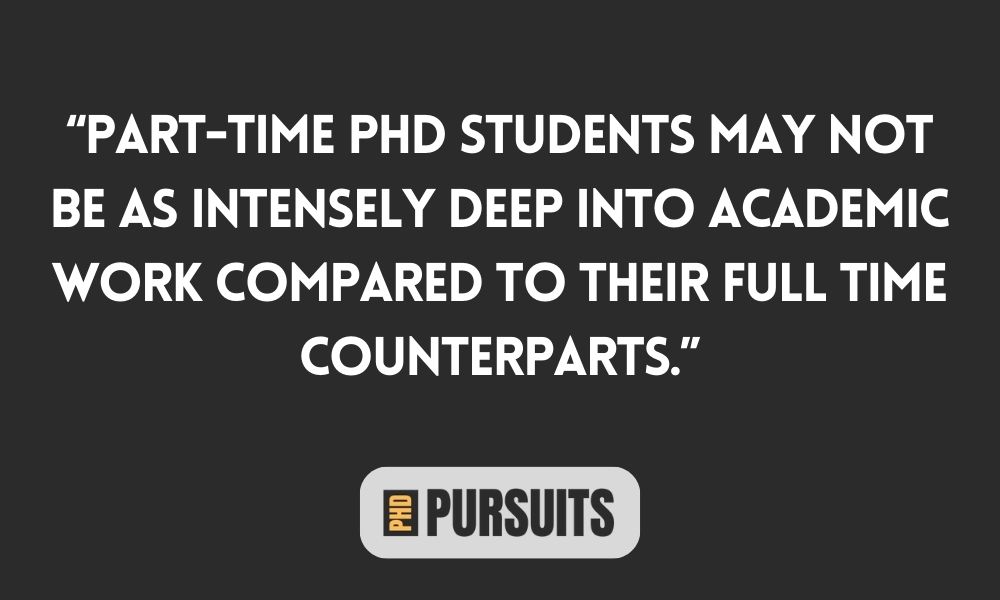
However, they bring valuable real-world experience to their research, enriching their academic pursuit with professional insights.
Peer and Faculty Interaction
Full-time PhD students usually have more opportunities for direct interaction with peers and faculty due to their physical presence on campus. This can foster a strong sense of community and support, crucial for navigating the challenges of doctoral studies.
Part-time students, especially those in programs offered online, may need to seek out these interactions more actively, using digital platforms to connect with their academic community.
What Are The Upsides In Doing PhD Part Time?
Work and study balance.
One of the most compelling reasons to opt for a part-time PhD is the ability to maintain a full-time job while advancing your academic credentials. This balance allows you to continue earning a salary, which can be especially beneficial if you have financial obligations or if your employer offers tuition assistance.
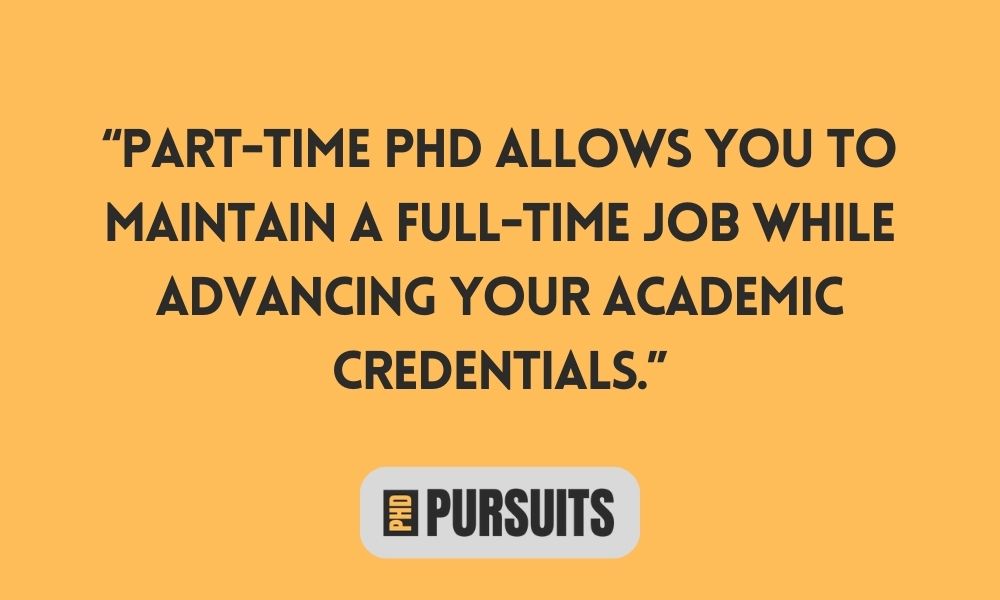
For example, many working professionals in fields such as education, engineering, and healthcare leverage part-time PhD programs to elevate their expertise without stepping away from their careers.
Application of Learning
As a part-time PhD student, you can apply your learning in real-time to your professional role. This immediate application not only enhances your work performance but also enriches your academic research with practical insights.
Institutions like George Washington University offer programs designed to integrate academic theory with professional practice, making your research more relevant and impactful.
Flexibility
Part-time PhD programs often offer greater flexibility in terms of scheduling and coursework delivery. Many programs provide evening or weekend classes, and a significant portion of the curriculum may be available online.
This flexibility allows you to tailor your academic pursuits around your personal and professional commitments, ensuring a more manageable and less stressful doctoral journey.
Networking Opportunities
Being engaged in a professional setting while pursuing your PhD provides ample networking opportunities. You can connect with professionals in your field of study, potentially opening doors to collaborative:
- research projects,
- industry partnerships, and
- future career prospects.
This dual engagement ensures that you’re not only building an academic network but also strengthening your professional ties.
Time Management and Personal Growth
Juggling a part-time PhD with a full-time job and other life responsibilities demands exceptional time management skills.
While challenging, this can lead to significant personal growth, making you more:
- resilient, and
The experience of managing multiple commitments can also enhance your CV, showcasing your ability to handle complex responsibilities and deadlines.
What Are The Downsides In Doing PhD Part Time?
Extended duration.
The most evident downside of a part-time PhD is the extended time to completion. Unlike the 3 to 5 years typically required for a full-time PhD, part-time students might take anywhere from 5 to 8 years or more.
This prolonged period can affect both personal and professional life plans, delaying the point at which you can fully leverage your doctoral degree in your career.
Limited Financial Aid
Although part-time PhD programs offer flexibility, they often come with less financial support compared to full-time programs. Full-time students tend to get financial support such as:
- scholarships,
- stipends, and
- teaching assistantships
This means funding a part-time PhD can become more challenging. You may need to rely more on personal finances or loans, potentially increasing the financial strain over the extended duration of the program.
Reduced Campus Engagement
Being a part-time student can limit your involvement in campus life and the academic community. Full-time students often benefit from closer relationships with faculty and more opportunities for research collaborations.
Part-time students, especially those juggling a full-time job, might find it harder to engage in these enriching experiences, which can be crucial for academic and professional development.
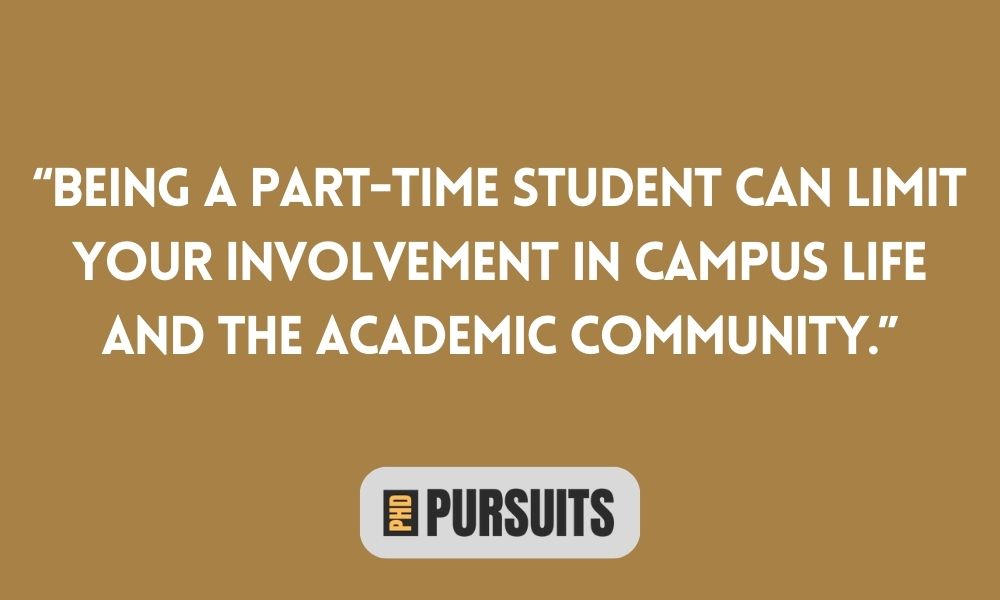
Time Management Challenges
Balancing trying to get a PhD with other commitments such as a full-time job or family responsibilities requires exceptional time management skills. The constant juggling act can lead to increased:
- depression,
- and burnout
The negative experience can be particularly during intensive periods of the program like the dissertation phase. This balancing act can also prolong the time it takes to complete your PhD, as you might find yourself able to dedicate less time to your studies than anticipated.
Potential Isolation
Part-time PhD students might experience a sense of isolation from their academic peers and supervisors, particularly if the program has a significant online component or if they can only visit campus infrequently.
This can make it more challenging to build the supportive networks that are often essential for navigating the highs and lows of doctoral study.
Where Are Some Of The Best Part Time PhD Programs In the US?
It could hard to choose what are the best part-time PhD and doctoral programs in the USA, as what constitutes as ‘best’ may be different for many people. Some may consider value, wanting to pay the least for a PhD. Some instead would ask for freedom or maximum flexibility in scheduling.
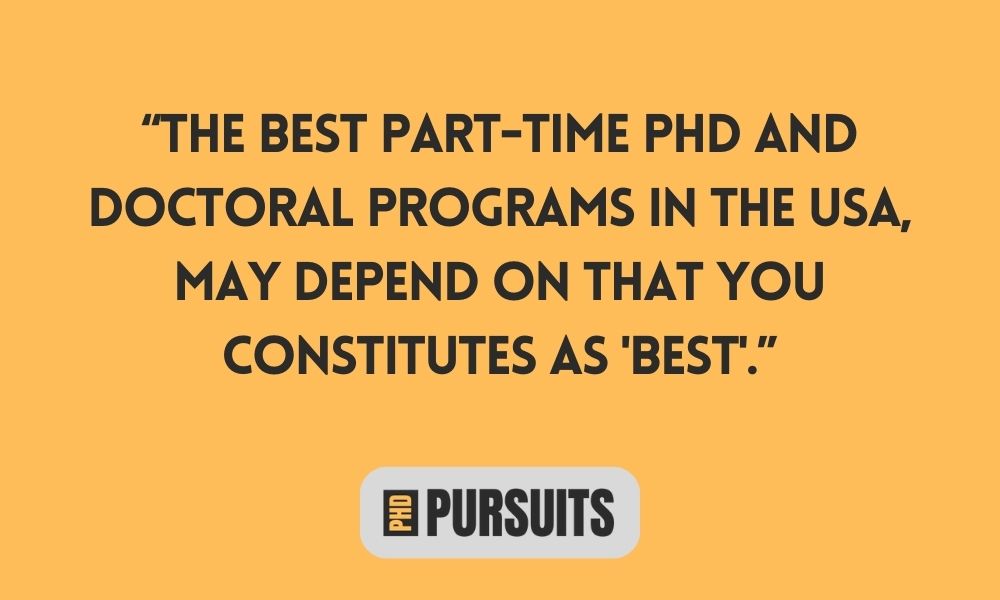
Dr. Imed Bouchrika , a data scientist from Research.com has however, published a report showcasing some of the best part time PhD programs available in the US. these include:
- Keiser University’s part-time online Doctor in Business Administration (DBA) blends theory and practical application. The program, which spans approximately 42 months, is designed for experienced professionals and aspiring academics alike, costing around $31,712.
- Liberty University offers a Doctor of Strategic Leadership program entirely online, emphasizing essential leadership principles. This flexible program, ideal for students balancing coursework with existing commitments, is structured around 8-week courses, enabling students to progress efficiently.
- Sullivan University’s part-time PhD in Management is for students looking to enhance their leadership potential in the management field. With a focus on relevant research and real-life applications is tailored to fit around your career commitments.
- Georgetown University’s Doctor of Nursing Practice (DNP) program caters to nurses aiming for advanced roles, focusing on ethical leadership and care accessibility. This distance-based, online program is designed for completion within 2 years, requiring 57 credits at a cost of $1,450 per credit.
- Johns Hopkins University’s part-time Doctor of Public Health (DrPH) program is designed for early- to mid-career professionals. The program encourages engagement in problem-based learning to address contemporary public health challenges, and could take between 4 to 9 years.
These programs reflect the evolving landscape of doctoral studies, offering paths that accommodate the demands of modern life while maintaining academic excellence.
Part-Time PhD: A Doctorate Degree Worth The Longer Grind
Pursuing a part-time PhD is a viable and increasingly popular option for those balancing professional and personal commitments. This is because many universities now offer the flexibility and support needed to achieve this prestigious degree.
Each program is uniquely designed to integrate seamlessly with your life, ensuring that the pursuit of academic excellence remains accessible and achievable for all aspiring scholars, including you.

Dr. JW Ong holds academic degrees, including a Ph.D. in Applied Linguistics from universities in New Zealand, Malaysia, and the UK. He started PhDPursuits.com as a way to share the experience he wish he would have had known before embarking on his PhD.

- Campus Safety
- (866) 825-5426
Pros & Cons: Full Time vs. Part Time PhD
Part-time vs. full-time phd: which one is right for you.
Returning to school can be a huge decision, especially if you’re a working adult. There are many factors to consider, including how you’ll find the time to do the required work. Because of this, many people may struggle to decide between a full-time and part-time PhD program.
The good news is that the only true difference between the two types of programs is the length of time it’ll take you to complete your work. The coursework and other components are typically the same.
This guide will help you weigh the pros and cons of committing to a full or part-time PhD program so that you can decide which option is best for your goals and lifestyle.
What’s the Difference Between a Part-Time and Full-Time PhD?
The only notable difference between a part-time and full-time PhD is the amount of time it takes you to complete your degree. You’ll still be responsible for completing the required research and coursework.
That being said, the experience of a part-time PhD program may feel significantly different from that of a full-time student because:
- Full-time PhD candidates have more time to spend on their research and coursework
- Part-time candidates may have other commitments competing with schoolwork
- Financial assistance opportunities may vary depending on your program choice
- Research for a full-time student might be more immersive
The best choice for you is going to be the option that allows you to balance your educational commitments with the rest of your life. To give you a better understanding of what these educational obligations might be, let’s take a deep dive into full and part-time PhD programs.
The Ins and Outs of Full-Time PhD Programs
A full-time PhD program is similar to a full-time job. It’s typically an immersive experience with two main goals:
- Grow a student’s knowledge about an important topic
- Provide training to improve skills through research and collaboration
The path to these outcomes can be quite lengthy. Although your specific road might look a little different based on the institution and field of study you choose, the typical PhD program includes: 1
- Coursework – You’ll likely begin your program by taking graduate courses in your field to expand your knowledge base. Courses in research methods and scholarly writing will also be part of your curriculum. These are important preparation for the writing you’ll be expected to do as you progress through your program.
- Research – The time you spend outside of the classroom will mainly be used to research for your dissertation. The skills you acquire through your coursework will help you unearth sources, conduct experiments, or perform other research tasks.
- Meetings – You’ll also have regularly scheduled meetings with your PhD supervisor. The frequency and length of these meetings will depend on your institution and program. Here, you’ll discuss your progress, review your research, and get advice about your work.
- Teaching or fieldwork – Some PhD candidates are required to teach a certain number of classes during their time with an institution. Others must complete an internship, fieldwork, or another project. Your requirements will depend on the program you’re enrolled in and the institution you attend.
- Writing the dissertation – The pinnacle of your PhD program is, of course, the dissertation. This can take years to complete and is often the factor that extends the length of time it takes someone to finish their studies. It’s the compilation of all of your hard work, research, analysis, and writing.
- Defending your dissertation – Once you make that final edit to your dissertation, you’re almost finished. However, there’s one crucial step remaining: your dissertation defense. This is an oral exam where you present and answer questions about your research to a committee. The committee then decides if you have passed or if corrections are needed.
After the defense and committee approval, you’ll submit the final copy of your manuscript and be awarded your coveted degree.

Required Coursework
Every PhD program is going to look a little different depending on your field of study and institution. A very general example of required coursework for a full-time student might look something like this:
- Year 1 – Two full semesters of coursework, including some specialized courses in your areas of study. More generalized research design and research methods courses may take up a significant portion of your classroom time.
- Year 2 – The second year will also contain two full semesters of classes. You’ll take more courses focused specifically on researching and developing a proposal. This will prepare you to begin working on your dissertation.
- Year 3 – Your course load will be smaller as your dissertation research and writing begins. If teaching, clinical work, or lab work is required in your program, you’ll work on these tasks while also working on your dissertation.
- Year 4 and beyond – You might have a few remaining courses to take, but your time after year three is primarily dedicated to your research and writing until your dissertation is complete.
Weekly Commitment
A full-time PhD program can be an intense endeavor. It requires approximately the same amount of time as a full-time job each week—about 35 to 40 hours. The way those hours are distributed depends on where you are in your program. For the first two years, the bulk of your time will likely be spent in the classroom.
After that, you’ll likely be researching, writing, and completing other required duties.
Completion Timeframe
According to the National Science Foundation’s “Survey of Earned Doctorates”, there were 55,283 completed doctorate degrees in the United States in 2020. 2 The median length of time from beginning to completion was 5.8 years. At a minimum, most PhD programs take about 4 years, but even full-time students can take longer.
The time it takes you to complete your PhD as a full-time student is heavily dependent on how quickly and effectively you complete your dissertation. Factors that can delay completion include:
- You struggle with your research
- Writing takes longer than expected
- Your dissertation requires significant edits
- Life circumstances interfere with your studies
It’s important to remember that taking longer to finish your degree doesn’t diminish the accomplishment. Don’t get discouraged if you need to make revisions or if your research isn’t finished as quickly as you’d hoped.
A Full-Time PhD Program Might be Right for You If…
Students who successfully enroll in full-time PhD programs do so with the understanding that it’s a significant time commitment. Full-time programs might be best suited for students who:
- Don’t hold a full-time job
- Have the financial support needed
- Can commit as many as 40 hours per week to their school work
- Have significant schedule flexibility to accommodate classes, research, and other obligations
You might also begin as a full-time student and later make the switch to part-time if your circumstances change.
The Ins and Outs of Part-Time PhD Programs
Part-time PhD programs can offer students a little more flexibility. In fact, no two part-time PhD students are likely to have a program that looks the same. However, there are a few common traits among part-time PhD programs, such as:
- More flexibility in coursework
- Less of a financial burden all at once since costs are spread out over a longer period
- Less disruptive of your other life commitments
- More time to research
In a part-time program, you’ll likely have more time to attend to your other obligations. The trade-off is that you’ll be a student for far longer than you would if you attend school full-time. The work you must do is the same as if you attend full-time, it’s just spread out over more years.
Some key differences in the time commitment include:
- Classroom time – You’ll take the same classes as a full-time student but instead of finishing most of the core work in the first year or two, it might take you three or four years.
- Weekly hours – If you’re a part-time student, you’ll likely spend half the hours working. This equates to about 15 to 20 hours per week that you’ll need to dedicate to school. Of course, this time might change depending on how your program and institution define part-time.
- Years to complete – The timeframe for part-time students to complete a PhD varies. The “Survey of Earned Doctorates” doesn’t differentiate between part and full-time students in its completion data. Anecdotally, a part-time PhD student might take anywhere from 5 to 10 years or more to complete their degree. 3
The biggest takeaway about part-time PhD programs is that they’re highly variable, especially when it comes to completion times.
A Part-Time PhD Program Might be Right for You If…
Many students can benefit from the flexibility offered by a part-time PhD program. You might be the perfect candidate if you:
- Have a family
- Need time for other obligations
- Prefer to work more slowly
Keep in mind that you might be able to start slowly and increase your workload as you go through your programs and life changes.
Find Your Perfect PhD Match
A PhD program can be a challenging and time-consuming commitment, whether you’re a full-time or part-time student. In fact, there isn’t a significant difference between the two, other than the time it takes to finish your degree. A part-time option can allow working adults or those with other life obligations to work toward a doctoral degree at a slower pace that’s more conducive to their needs.
If you’re considering a full or part-time PhD program, Alliant International University might be the right choice for you. Check out our offerings today to see if we’re a perfect match for your educational goals.
Sources:
- “The PhD Experience: A Review of the Factors Influencing Doctoral Students’ Completion, Achievement, and Well-Being.” International Journal of Doctoral Studies. 2018. http://ijds.org/Volume13/IJDSv13p361-388Sverdlik4134.pdf . Accessed January 27, 2022.
- “Survey of Earned Doctorates.” National Science Foundation. November 30, 2021. https://ncses.nsf.gov/pubs/nsf22300/data-tables . Accessed January 27, 2022.
- “How Long Does it Take to Get a PhD Degree?” U.S. News and World Report. August 12, 2019. https://www.usnews.com/education/best-graduate-schools/articles/2019-08… . Accessed January 27, 2022.

Alliant International University
Other categories, university announcements, featured news, nursing and health sciences, start on your path to succeed on purpose, request information.
- 1 Current Select Interests
- 2 Provide Information
You might also like
How to plan for educational expenses.
How to Plan for Educational Expenses For many people, one of the biggest hurdles to higher education is the cost. Both...
How to Make Money in Grad School
How to Make Money in Grad School: Our Expert Advice The grad school experience is known for a lot of things: rich learning...
FAFSA Requirements & Qualifications
What are the Requirements for FAFSA? Most students will likely require some type of financial assistance to pay for school. The...
- Is a PhD Worth it?
Written by Mark Bennett
Whether a PhD is worth it or not entirely depends on what you want to get out of it. If you want to enter academia, then you'll likely need a PhD. However, those who don't need the degree for their career still find that doctoral study helps them gain and refine useful skills benefitial to industry.
This page will help you to define the value of a PhD degree and understand how much a PhD is worth (and to who).
On this page
Phd careers and employment prospects.
One of the first ways you might decide if a PhD is worth it is by working out whether it will improve your career prospects. So, how employable are PhD graduates – and what jobs do they actually do?
You may be surprised how diverse the answers to these questions are.
PhD employment statistics
Data suggests that PhD students are very employable, with the majority finding work or going on to further training (such as a ‘PostDoc’) after graduation.
As you can see from the table below, a PhD can make a difference to your employment prospects when compared with a taught Masters qualification.
| Status | Masters (taught) | Doctoral research |
|---|---|---|
| Full-time employment | 69% | 70% |
| Part-time employment | 9% | 9% |
| Employment and further study | 8% | 10% |
| Further study | 3% | 4% |
| Other | 4% | 5% |
| survey, conducted by . It reveals the destinations of UK university graduates after 15 months. | ||
For more information and statistics on this, check out our guide to PhD employability .
What's a PostDoc?
A PostDoctoral Fellowship (or 'PostDoc') is often the next step in an academic career, after a PhD. PostDocs are short-term paid positions that usually focus on a specific research project. You can find out more about PostDoctoral projects and opportunities at FindAPostDoc.com
What can you do with a PhD? – typical careers
The modern PhD is a surprisingly versatile qualification that develops a wide range of transferrable skills. Universities also support students within broad doctoral programmes that focus on developing employable PhD graduates.
All of this means that the job market for PhD students is quite diverse.
Many students do go on to careers in higher education, but these include administration and leadership positions as well as academic posts.
Others take their research and teaching expertise into other professions – including secondary and further education, industry or public administration.
What else do PhD graduates do?
A PhD does far more than prepare you for a career in higher education. Read our guide for more information on popular non-academic careers with a PhD – and how to get started with one.
Assessing the value of a PhD to you
Whether a PhD is worth it very much depends on your individual aspirations and plans.
It’s common for students to set out on a PhD with an academic career in mind – inspired by a passion for their subject at undergraduate and Masters level.
There’s nothing wrong with this, but you should also spend a bit of time considering the higher education job market – and learning a little about what an academic career involves.
Our Pulse survey shows that there’s almost an even split between those of you interested in doing a PhD because you want a career in academia, and those of you that aren’t interested in going down the academic route. We dug a little deeper into the survey and around 5% more of those interested in going into academia are interested in Arts and Humanities academic roles. There’s also around a 10% difference between those interested in studying STEM and those interested in AHSS when it comes to subject interest, with STEM being more motivated to study due to subject interest.
The vast majority of university researchers and lecturers in countries like the UK do have a PhD. But that doesn’t mean that the majority of PhD graduates go on to become university researchers and lecturers. In fact, many don’t.
If you are pursuing a PhD as the next step in an academic career, that’s great. Academic work is incredibly rewarding (and potentially very well paid). But it it’s prudent to understand the profession you’re preparing for – and to keep your options open.
Do you want to be an academic?
If you are pursuing a PhD as the next step in an academic career, that’s great. Academic work is incredibly rewarding (and potentially very well paid). But it’s prudent to understand the profession you’re preparing for – and to keep your options open.
Do you have another career in mind?
For some, a PhD is enough to scratch their ‘research itch’ and they decide to take their skills and experience into other careers . Others find that the academic job market is very competitive or that an academic job doesn’t appeal to them. And an increasing number have a completely different career in mind.
The modern PhD is a versatile qualification offering the transferrable skills described above as well as the chance to acquire incredibly advanced expertise.
There are plenty of careers that benefit from the kind of diverse CV a PhD develops. And, even if you want to be an academic, it’s worth thinking about a few of them before you start.
Will funding be available?
PhD fees aren’t actually that high. They’re a lot lower than undergraduate fees and usually less than those for Masters degrees.
But the full cost of a PhD needs to take into account more than just tuition fees. You’ll need to support yourself for at least three more years of study.
That’s three years in which you won’t be earning very much and during which your career development will probably be on hold. So there’s an ‘opportunity cost’ involved in PhD study – the earnings or career progress you might otherwise have made.
The simplest way to offset this is by acquiring funding for your PhD. A range of options are out there, from pre-funded projects to individual scholarships and doctoral loans.
Set aside some time to find out what kind of support might be available for the kind of project you want to complete. Researching research funding may not be exciting, but it could well be worth it.
Are you committed enough to see the project through?
You may decide that a PhD is definitely worth the cost, but will it be worth the hard work?
This may seem like an odd question to include here. Surely your dedication to further study and the value of the qualification you gain are two different things?
Well, not quite. For the simple reason that, whatever the worth of a completed PhD, an uncompleted one is worth a lot less.
It doesn’t matter what you plan to do with your PhD or how much it ends up costing you: if you don’t finish your project you’ll have little to show for whatever time and money you have invested.
That’s not to say that failing to complete a PhD will ruin your life. Some students do exit their programmes early and go on to have productive careers. Some even submit for alternative qualifications such as the MPhil .
But failing to complete a PhD is rarely a desirable or ideal outcome. So go into the process with your eyes open and make sure you know what’s involved. Our advice on doing a PhD is a good place to start.
Transferrable skills – what else does a PhD teach you?
PhDs are highly specialised qualifications. In fact, they’re the most specialised qualifications available. By its very nature every PhD is a unique project, focussing on a topic no one has researched before.
But PhDs aren’t just about specialisation. Successfully completing a three-year research project means developing many more general skills, all of which are highly transferrable.
There are relatively few non-academic careers based on the theological significance of eighteenth-century lyric poetry or the effects of altitude on arboreal biodiversity.
But there are lots of careers out there for self-motivated project managers with excellent organisational skills, experience of public speaking and event planning plus the ability to effectively analyse and communicate large amounts of complex information.
Those people are very employable. And your PhD could make you one of them.
The following are some of the core transferrable skills you’re likely to develop during a PhD.
Project management
This one is fairly obvious, but it’s probably more significant than you give it credit for.
A PhD requires you to complete an extended research project and to do so almost entirely independently. You’ll have support from your supervisor, but the day to day management of your time, resources and objectives is down to you.
You’ll need to assess the demands of specific tasks, plan ahead to ensure the availability of key materials and solve a wide range of problems (both anticipated and unforeseen).
You might also be responsible for managing expenses and keeping your project within the limits set by its own funding – or that of the research group you’re working within.
Even a self-financed PhD involves managing a budget – and potentially securing additional investment for your work.
Professional networking
Successful managing a PhD project can also mean successfully managing your relationships with other people.
You’ll need to maintain a productive relationship with your supervisor and with fellow students within your laboratory, workshop or department.
Looking further afield, you’ll need to identify and connect with researchers working on similar topics at other universities. And, if you present at conferences yourself, you’ll become experienced in sharing information within an expert network and discussing ideas with your professional peers.
It’s also highly likely that you’ll work more closely with other researchers at some point during your PhD. This could be part of a short-term project, or whilst organising a conference or other event (see below).
So don’t be misled by the image of the solitary scholar: collaboration, team-work (and team building) are also important parts of a modern PhD.
Teaching and mentoring
Academic teaching is another part of the typical PhD experience. Most universities provide at least some opportunity for postgraduate researchers to lead classes, demonstrate experiments or mentor undergraduate students.
This is important training for an academic career, but it’s not just limited to work in the university sector.
Teaching experience is obviously useful if you’re interested in working in other branches of education – such as a secondary school or sixth form college. Showing that you can communicate your specialist subject knowledge is a great way to leverage a PhD for these careers.
Academic teaching also tends to involve coursework assessment, feedback and one-to-one tutorials. These skills can transfer out of purely educational contexts as you develop experience in mentoring others and providing leadership.
Publication
Academic publication isn’t part of every PhD, but many students do have the opportunity to author journal articles or produce other records of their research.
This kind of publication is obviously different to ‘commercial’ or ‘popular’ publishing (we’re not suggesting it’s a short-step from a Nature paper to winning the Man Booker Prize). But some of the skills you’ll gain are common to all forms of publication.
Preparing, copy-editing and proofing a professional manuscript is necessary to publication in all contexts: whether you’re authoring a journal article, a novel, an industry whitepaper – or a website.
And proficiency in composing and communicating complex ideas is valuable in many careers – even the ones that don’t actually involve ‘publication.’
Public speaking
You might think it strange to think of PhD research as an opportunity to develop skills in oral communication, but the presentation and discussion of your ideas will play an important role in their development.
The majority of students speak at academic conferences at some point during their doctorates. This is an important means of making the academic community aware of your work and of receiving expert feedback.
In the process you’ll also become a capable public speaker, with the ability to select and shape material for a presentation and the confidence to deliver that presentation professionally and effectively.
And remember, the topic of a presentation isn’t important. It doesn’t matter if you’re speaking about economic history in front of an audience of academics or about market research in front of an audience of clients. Both scenarios require you to present specialist information, effectively, to other specialists.
Event management and organisation
PhD students don’t just speak at conferences: they often have the chance to organise them. This can range from running small seminar events to planning and arranging large international conferences.
The challenges involved in this – booking venues, setting up facilities, advertising, registering, taking care of delegates – aren’t unique to academia. They also crop up in a range of professions where large conferences and events are a regular occurrence – from politics to trade fairs.
Branches of some careers – such as marketing or entertainment – actually focus entirely upon events management.
One of the most valuable skills you gain with a PhD could, quite simply, be the ability to do research.
The task of identifying, managing and analysing large amounts of complex information isn’t simple. Nor is it easy to digest that information and re-present your conclusions in an appropriate and useful format.
As a PhD student, you’re going to become an undisputed expert in doing all of this. Because, if nothing else, your doctorate will make you a professional researcher.
And professional researchers don’t just work in academia. All sorts of careers draw upon these skills, from public administration, government and politics to public relations management, marketing and journalism.
Ready to do a PhD?
Search our project listings to find out what you could be studying.

We've answered some of the most frequently asked questions about PhDs, covering course types, applications, funding and the benefits of further study.

Will a PhD help you get a job or earn a better salary? And what are your career prospects in and outside of academia?

Everything you need to know about part-time and full-time work as a student or recent graduate in the USA.

Everything you need to know about part-time and full-time work in Germany as a student or recent graduate in Germany.

Everything you need to know about working in France during and after your postgraduate degree, including French work visas, job opportunities and popular industries.

Everything you need to know about part-time and full-time work in Italy as a student or recent graduate.
Want More Updates & Advice?
FindAPhD. Copyright 2005-2024 All rights reserved.
Unknown ( change )
Have you got time to answer some quick questions about PhD study?
Select your nearest city
You haven’t completed your profile yet. To get the most out of FindAPhD, finish your profile and receive these benefits:
- Monthly chance to win one of ten £10 Amazon vouchers ; winners will be notified every month.*
- The latest PhD projects delivered straight to your inbox
- Access to our £6,000 scholarship competition
- Weekly newsletter with funding opportunities, research proposal tips and much more
- Early access to our physical and virtual postgraduate study fairs
Or begin browsing FindAPhD.com
or begin browsing FindAPhD.com
*Offer only available for the duration of your active subscription, and subject to change. You MUST claim your prize within 72 hours, if not we will redraw.

Do you want hassle-free information and advice?
Create your FindAPhD account and sign up to our newsletter:
- Find out about funding opportunities and application tips
- Receive weekly advice, student stories and the latest PhD news
- Hear about our upcoming study fairs
- Save your favourite projects, track enquiries and get personalised subject updates

Create your account
Looking to list your PhD opportunities? Log in here .
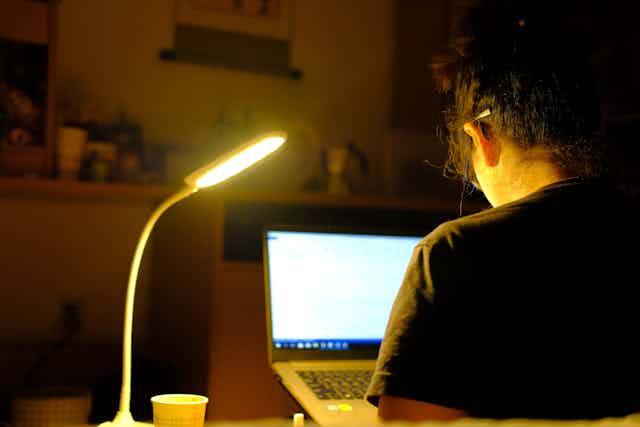
Is it a good time to be getting a PhD? We asked those who’ve done it
Researcher, College of Nursing and Health Sciences, Flinders University
Postdoctoral Research Associate, College of Nursing and Health Sciences, Flinders University
Disclosure statement
Career Sessions was sponsored by a grant from Inspiring SA ( https://inspiringsa.org.au/ ).
Flinders University provides funding as a member of The Conversation AU.
View all partners
The number of Australian PhD graduates reached around 10,000 a year in 2019, twice as many as in 2005. However, the number of PhDs has been exceeding the available academic positions since as early as the mid-1990s. In 2020, universities purged around 10% of their workforce due to the pandemic, and many university careers are still vulnerable .
Given these statistics, you might wonder if doing a PhD is still a good idea. Based on our discussions with PhD holders, there are still plenty of very good reasons, which is good news in 2021.
Read more: 2021 is the year Australia's international student crisis really bites
In June 2020 we interviewed 12 PhD holders from multiple disciplines for our podcast Career Sessions to investigate the question: why do a PhD?
Why do a PhD?
The PhD is a mechanism for developing high-level research skills, learning about rigours of science or the development of theory. It sets you up with project management, problem-solving and analytical skills that are meaningful within and beyond academia.
“It just taught me all those transferable skills, project management, and also now starting businesses. I’m amazed at how close starting a business is to doing a science project.” – Dr Andy Stapleton
For our interviewees, the PhD is an opportunity to dive deeply into a topic they are passionate about. They also considered contributing new knowledge to be a privilege. The process taught them to be better thinkers, critical thinkers, and to view the world through new eyes.
“The mental fitness to work at a high level, to be able to think at a high level, to be able to write it […] The topic is less important.” – Dr Gareth Furber
The PhD is a voyage of discovery to a better understanding of how things work. It gives them a credible platform from which their voice can be heard and respected, and they can contribute to change.
“I think it’s definitely like a springboard or something. It launches you into a whole other place and it gives you […] more of a voice. It’s a political act for me. It’s about making change.” – Dr Elizabeth Newnham
The PhD is a tough and sometimes painful journey, but ultimately rewarding. The extraordinary was tempered by frustration, and the experience shaped their lives, increasing self-confidence and leading to new self-awareness.
Read more: PhD completion: an evidence-based guide for students, supervisors and universities
When asked whether they would they do it again, no-one hesitated in saying “yes”.
“You will never stretch your brain in a way that a PhD forces you to.” – Professor Kate Douglas.
The PhD is not necessarily a golden ticket to an academic career, but the experience and skills you develop will be meaningful for your future.
“What I’d done in my PhD gave me a lot broader sense than just my own personal experience. There were a lot of people that have heard me speak and a lot of that’s been informed by the PhD. So it might not be direct, but it’s informed who I am.” – Dr Susan Close
Advice from our guests

Keep both your eyes and your mind open. Pick a topic you are passionate about. Speak to people both within and outside academia to find out where this could lead. Think about whether you actually need a PhD to get to where you want to be.
You’ll have to make some judgement calls about how a PhD can fit into your life.
And find the right supervisor! They are the most important relationship you will have throughout your candidature, and they are a solid reference for what comes next. Finding the right supervisor will always enhance your PhD experience .
Read more: Ten types of PhD supervisor relationships – which is yours?
A PhD isn’t right for everyone. Ask yourself, is it the right time for you and your research interests? Are you resilient? Mental health among PhD students is poor
Our podcast guests have witnessed PhD students’ struggles. The pathway of a PhD candidate is not linear. There are many ups and downs. You will meander in many unplanned directions and often take wrong turns.
When you have completed your PhD, the hard work is really just starting. It is a gateway, but there are a lot of PhDs out there. It is what comes next that really counts.
“It’s a gateway. You’re learning how to do research. But if you really want to be successful afterwards, you need to apply that, and be diligent about that as well, and have a good work ethic.” – Dr Mark Krstic
Read more: 1 in 5 PhD students could drop out. Here are some tips for how to keep going
A PhD in any field is an achievement. Even the most niche topics will contribute knowledge to a field that is important for many people. The reward is intrinsic and only you can identify how doing a PhD will contribute to your life. It gives you a great toolkit to identify the doors that are appropriate for you.
“The first paper was the most exciting thing. […] at that time I thought of papers as like a version of immortality. My name is on something that will last forever. I think this is my legacy.” – Dr Cameron Shearer
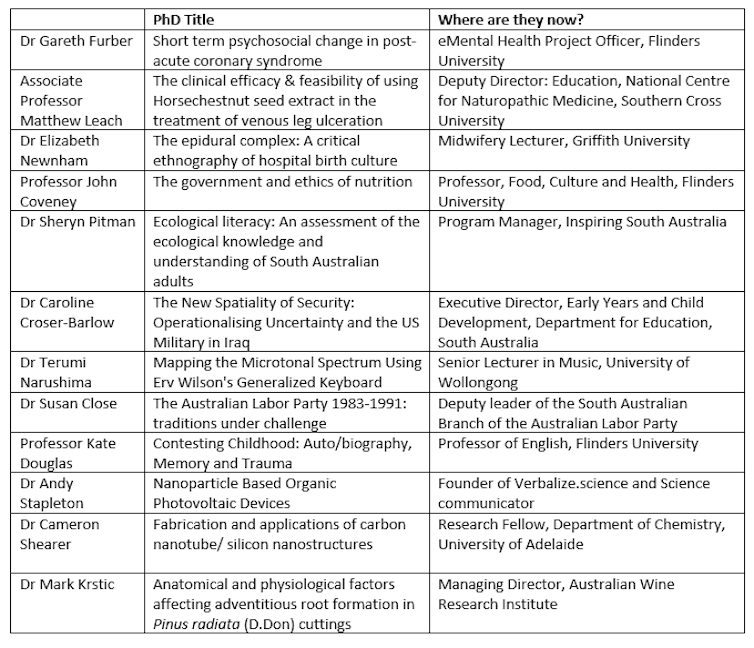
- Higher education
- PhD supervisors
- PhD students
- PhD research
- PhD candidates

Student Internship Officer

Apply for State Library of Queensland's next round of research opportunities

Associate Professor, Psychology

Professor and Head of School, School of Communication and Arts

Management Information Systems & Analytics – Limited Term Contract
- Work & Careers
- Life & Arts
Is it worth doing a PhD when an academic career is not the goal?
To read this article for free register now.
Once registered, you can:
- Read free articles
- Get our Editor's Digest and other newsletters
- Follow topics and set up personalised events
- Access Alphaville: our popular markets and finance blog
- Global news & analysis
- Expert opinion
- Special features
- FirstFT newsletter
- Videos & Podcasts
- Android & iOS app
- FT Edit app
- 10 gift articles per month
Explore more offers.
Standard digital.
- FT Digital Edition
Premium Digital
Print + premium digital, ft professional, weekend print + standard digital, weekend print + premium digital.
Then $75 per month. Complete digital access to quality FT journalism. Cancel anytime during your trial.
- Global news & analysis
- Exclusive FT analysis
- FT App on Android & iOS
- FirstFT: the day's biggest stories
- 20+ curated newsletters
- Follow topics & set alerts with myFT
- FT Videos & Podcasts
- 20 monthly gift articles to share
- Lex: FT's flagship investment column
- 15+ Premium newsletters by leading experts
- FT Digital Edition: our digitised print edition
- Weekday Print Edition
- Videos & Podcasts
- Premium newsletters
- 10 additional gift articles per month
- FT Weekend Print delivery
- Everything in Standard Digital
- Everything in Premium Digital
Today's FT newspaper for easy reading on any device. This does not include ft.com or FT App access.
- 10 monthly gift articles to share
- Everything in Print
- Make and share highlights
- FT Workspace
- Markets data widget
- Subscription Manager
- Workflow integrations
- Occasional readers go free
- Volume discount
Essential digital access to quality FT journalism on any device. Pay a year upfront and save 20%.
Terms & Conditions apply
Explore our full range of subscriptions.
Why the ft.
See why over a million readers pay to read the Financial Times.

- 3 . 01 . 20
- Leaving Academia
Is a PhD Worth It? I Wish I’d Asked These 6 Questions First.
- Posted by: Chris
Updated Nov. 19, 2022
Is a PhD worth it?
Should I get a PhD?
A few people admit to regretting their PhD. Most—myself included — said that they don’t ( I wrote about why in this post ).
But we often say we don’t regret stupid things we’ve done or bad things that happen to us. This means we learned from them, not that we wanted them to happen.
So just because PhDs don’t regret it, doesn’t mean it was worth it.
But if you were to ask, Is a PhD worth it, it’s a different and more complicated question.
When potential PhD students ask me for advice, I hate giving it. I can’t possibly say whether it will be worth it for them. I only know from experience that for some PhDs the answer is no.
In this post, I’ll look at this question from five different directions, five different ways that a PhD could be worth it. Then I give my opinion on each one. You can tell me if I got the right ones of if I’m way off base. So here we go.
This is post contains affiliate links. Thanks for supporting Roostervane!
tl;dr It’s up to you to make it worth it. A PhD can hurt your finances, sink you in debt, and leave you with no clear path to success in some fields. But PhDs statistically earn more than their and have lower unemployment rates. A PhD also gives you a world-class mind, a global network, and a skill set that can go just about anywhere.
Should I Get a PhD?
tl;dr Don’t get a PhD by default. Think it through. Be clear about whether it’s going to help you reach career goals, and don’t expect to be a professor. A few rules of thumb- make sure you know where you want to go and whether a PhD is the ONLY way to get there, make sure it’s FUNDED (trust me), and make sure your program has strong ties into industry and a record of helping its students get there.
1. Is a PhD worth it for your finances?
My guess: Not usually
People waste a lot of their best years living on a grad stipend. To be honest, my money situation was pretty good in grad school. I won a large national grant, I got a ton of extra money in travel grants, and my Canadian province gave me grants for students with dependents. But even with a decent income, I was still in financial limbo–not really building wealth of any sort.
And many students scrape by on very small stipends while they study.
When it comes to entering the marketplace, research from Canada and the United States shows that PhD students eventually out-earn their counterparts with Master’s degrees. It takes PhDs a few years to find their stride, but most of us eventually do fine for earnings if we leave academia. Which is great, and perhaps surprising to many PhDs who think that a barista counter is the only non-academic future they have .
The challenge is not income–it’s time. If you as a PhD grad make marginally more than a Master’s graduate, but they entered the workforce a decade earlier, it takes a long time for even an extra $10,000 a year to catch up. The Master’s grad has had the time to build their net worth and network, perhaps buy a house, pay down debt, invest, and just generally get financially healthy.
While PhDs do fine in earnings in the long run, the opportunity cost of getting the PhD is significant.
The only real way to remedy this—if you’ve done a PhD and accumulating wealth is important to you, is to strategically maximize your earnings and your value in the marketplace to close the wealth gap. This takes education, self-discipline, and creativity, but it is possible.
I tried to calculate the opportunity cost of prolonging entry into the workforce in this post .
2. Is a PhD worth it for your career?
My guess: Impossible to tell
Most of my jobs have given me the perfect opportunity to see exactly where I could be if I’d stopped at a Master’s degree, often working alongside or for those who did and are further ahead. In terms of nuts and bolts of building career experience section on a resume, which is often the most important part, a PhD is rarely worth it. (Some STEM careers do require a PhD.)
However, at the start of my post-graduate educational journey, I was working part-time running teen programs and full time as a landscaper. I had an undergraduate degree. Despite my job and a half, I was still poor. My life had no direction, and had I not begun my Master’s to PhD journey I probably would have stayed there.
The PhD transformed me personally. It did this by developing my skills, or course. But even more so, it taught me that anything is possible. It took a poor kid from a mining town in northern Canada and gave me access to the world. It made my dreams of living abroad come true. I learned that anything is possible. And that will never go away.
It’s changed the course of my life and, subsequently, my career.
It’s impossible for you to know if it’s worth it for your career. But you can build a hell of a career with it.
So it wouldn’t be fair for me to say, “don’t get a PhD.” Because it worked out for me, and for some it does.
But there are a heck of a lot of people who haven’t figured out how to build a career with this thing. Which is one of the reasons Roostervane exists in the first place.
Psst! If you’re looking at doing a PhD because you don’t know where to go next with your career–I see you. Been there. Check out my free PDF guide– How to Build a Great Career with Any Degree.
3. Is a PhD worth it for your personal brand?
My guess: Probably
There’s some debate over whether to put a Dr. or PhD before or after your name. People argue over whether it helps in the non-academic marketplace. Some feel that it just doesn’t translate to whatever their new reality is. Some have been told by some manager somewhere that they’re overqualified and pulled themselves back, sometimes wiping the PhD off their resume altogether.
The truth is, if you have a PhD, the world often won’t know what to do with it. And that’s okay. Well-meaning people won’t understand how you fit into the landscape, and you may have to fight tooth and nail for your place in it. People may tell you they can’t use you, or they might go with what they know—which is someone less qualified and less-educated.
It happens.
But someone with a PhD at the end of their name represents an indomitable leader. So grow your possibilities bigger and keep fighting. And make your personal brand match those three little letters after your name. Do this so that the world around can’t help but see you as a leader. More importantly, do it so that you don’t forget you are.
Should I put “PhD” after my name on LinkedIn?
5 reasons you need to brand yourself
4. Is a PhD worth it for your sense of purpose?
Is getting a PhD worth it? For many people the answer is no.
PhDs are hurting.
If you’ve done one, you know. Remember the sense of meaning and purpose that drew you towards a PhD program? Was it still there at the end? If yours was, you’re lucky. I directed my purpose into getting hired in a tenure-track job, and got very hurt when it didn’t happen.
And people have vastly different experiences within programs.
Some people go through crap. But for them their research is everything and putting up with crap is worth it to feel like they have a sense of purpose. Many PhDs who are drawn into programs chasing a sense of purpose leave deeply wounded and disenchanted, ironically having less purpose when they started.
While new PhDs often talk about the PhD as a path do doing “something meaningful,” those of us who have been through entire programs have often seen too much. We’ve either seen or experienced tremendous loss of self. Some have friends who didn’t make it out the other end of the PhD program.
But there are some PhDs who have a great experience in their programs and feel tremendously fulfilled.
As I reflect on it, I don’t think a sense of purpose is inherently fulfilled or disappointed by a PhD program. There are too many variables.
However, if you’re counting on a PhD program to give you a sense of purpose, I’d be very careful. I’d be even more cautious if purpose for you means “tenure-track professor.” Think broadly about what success means to you and keep an open mind .
5. Is my discipline in demand?
Okay, so you need to know that different disciplines have different experiences. Silicon Valley has fallen in love with some PhDs, and we’re seeing “PhD required” or “PhD preferred” on more and more job postings. So if your PhD is in certain, in-demand subjects… It can be a good decision.
My humanities PhD, on the other hand, was a mistake. I’m 5 years out now, and I’ve learned how to use it and make money with it. That’s the great news. But I’d never recommend that anyone get a PhD in the humanities. Sorry. I really wish I could. It’s usually a waste of years of your life, and you’ll need to figure out how to get a totally unrelated job after anyway.
TBH, most of the skills I make money with these days I taught myself on Skillshare .
6. Is a PhD worth it for your potential?
My guess: Absolutely
Every human being has unlimited potential, of course. But here’s the thing that really can make your PhD worth it. The PhD can amplify your potential. It gives you a global reach, it gives you a recognizable brand, and it gives you a mind like no other.
One of my heroes is Brené Brown. She’s taken research and transformed the world with it, speaking to everyone from Wall-Street leaders to blue-collar workers about vulnerability, shame, and purpose. She took her PhD and did amazing things with it.
Your potential at the end of your PhD is greater than it has ever been.
The question is, what will you do with that potential?
Many PhD students are held back, not by their potential, but by the fact that they’ve learned to believe that they’re worthless. Your potential is unlimited, but when you are beaten and exhausted, dragging out of a PhD program with barely any self-worth left, it’s very hard to reach your potential. You first need to repair your confidence.
But if you can do that, if you can nurture your confidence and your greatness every day until you begin to believe in yourself again, you can take your potential and do anything you want with it.
So why get a PhD?
Because it symbolizes your limitless potential. If you think strategically about how to put it to work.
PhD Graduates Don’t Need Resumes. They Need a Freaking Vision

By the way… Did you know I wrote a book about building a career with a PhD? You can read the first chapter for free on Amazon.
So if you’re asking me, “should I do a PhD,” I hope this post helps you. Try your best to check your emotion, and weigh the pros and cons.
And at the end of the day, I don’t think that whether a PhD is worth it or not is some fixed-in-stone thing. In fact, it depends on what you do with it.
So why not make it worth it? Work hard on yourself to transform into a leader worthy of the letters after your name, and don’t be afraid to learn how to leverage every asset the PhD gave you.
One of the reasons I took my PhD and launched my own company is that I saw how much more impact I could have and money I could be making as a consultant (perhaps eventually with a few employees). As long as I worked for someone else, I could see that my income would likely be capped. Working for myself was a good way to maximize my output and take control of my income.
It’s up to you to make it worth it. Pick what’s important to you and how the degree helps you get there, and chase it. Keep an open mind about where life will take you, but always be asking yourself how you can make more of it.
Check out the related post- 15 Good, Bad, and Awful Reasons People Go to Grad School. — I Answer the Question, “Should I Go to Grad School?” )

Consulting Secrets 3 – Landing Clients
Photo by Christian Sterk on Unsplash There’s a new type of post buzzing around LinkedIn. I confess, I’ve even made a few. The post is

You’re Not Good Enough… Yet
Last year, I spent $7k on a business coach. She was fantastic. She helped me through sessions of crafting my ideas to become a “thought

$200/hr Expert? Here’s the Secret!
Photo by David Monje on Unsplash I was listening to Tony Robbins this week. He was talking about being the best. Tony asks the audience,
SHARE THIS:
EMAIL UPDATES
Weekly articles, tips, and career advice
Roostervane exists to help you launch a career, find your purpose, and grow your influence
- Write for Us
Terms of Use | Privacy | Affiliate Disclaimer
©2022 All rights reserved
- Interesting
- Scholarships
- UGC-CARE Journals
Is a Part-Time PhD Worth it?
10 differences between Full-time and part-time PhD
PhD programs that are offered full-time or part-time have many differences. The duration of time needed for each program is the most noticeable difference. While a part-time PhD program might take anywhere from six to eight years to finish, a full-time PhD program normally requires four to five years of full-time study. In this article, we have listed the 10 differences between Full time vs part-time PhD.
What is a Part-Time PhD?
A part-time PhD is a research degree that is completed over a longer period of time than a full-time PhD. This allows scholars to work while they study, which can be beneficial for those who want to continue working in their field while also pursuing their studies.
What is a Full-Time PhD?
A full-time PhD is a doctoral degree that is earned by completing all required coursework and research within a set timeframe. This type of PhD typically takes between four and six years to complete.
Full-Time vs Part-Time Ph.D. | 10 Differences
- Full-time PhD scholars are expected to complete their degree within a certain time frame, usually 4-5 years. Part-time PhD scholars may take longer to finish their degree.
- Full-time PhD scholars typically take more courses and have more research requirements than part-time scholars.
- Full-time PhD scholars are usually supported by their university or research institution through fellowships or assistantships. Part-time scholars typically have to pay their own way.
- Full-time PhD scholars usually have to relocate to attend their chosen school, while part-time scholars can often study from home.
- Full-time PhD scholars typically have more contact with their supervisors and other faculty members than part-time students.
- Full-time PhD scholars are usually expected to participate in departmental activities and events. Part-time scholars may have less opportunity to do so.
- Full-time PhD scholars typically have more access to resources and support services than part-time scholars.
- Full-time PhD scholars may be able to take advantage of teaching opportunities to gain experience in their field. Part-time scholars may not have this opportunity.
- Full-time PhD scholars may be able to complete their degree faster if they are able to devote more time to their studies. Part-time scholars may take longer to finish their degrees.
- Full-time PhD scholars may have a higher chance of getting a job after graduation than part-time scholars.
10 Difficulties in pursuing a Full-Time Ph.D.?
There are many difficulties that come with undertaking a full-time PhD, especially if you are also working full-time. Some of the main difficulties include:
- Time management – it can be difficult to juggle a full-time job, family life, and your PhD studies.
- Finances – a PhD can be expensive, especially if you are self-funding your studies.
- Motivation – it can be difficult to stay motivated when you are working on your PhD full-time.
- Time pressure – you may feel like you don’t have enough time to complete your PhD to a high standard.
- Isolation – you may feel isolated from your friends and family as you spend more time working on your PhD.
- Stress – the pressure of completing a PhD can be stressful and may lead to anxiety or depression.
- Procrastination – it can be easy to procrastinate when you are working on your PhD full-time.
- Lack of sleep – you may find that you are sleeping less because you are working on your PhD.
- Poor diet – you may find that you are eating unhealthily because you don’t have time to cook or eat properly.
- Exhaustion – you may feel exhausted from juggling your full-time job, family life and PhD studies.
Is a part-time PhD equivalent to a full-time Ph.D.?
There is no universally accepted answer to this question, as the equivalency of part-time and full-time Ph.D. programs can vary depending on the institution and field of study. However, some reasons why a part-time PhD may be considered equivalent to a full-time Ph.D. include the fact that part-time scholars typically complete the same coursework and research requirements as full-time scholars, and they often have the same opportunities to present their work at conferences and publish their findings in academic journals.
Is a Full-Time Ph.D. Worth it?
A full-time PhD is worth it if you are passionate about your research and want to pursue a career in academia or a related field. It is also worth it if you are able to balance your time between your research and your personal life.
There is no easy answer to this question. It depends on your individual circumstances and goals. If you are certain that you want to pursue a career in academia or research, then a part-time PhD may be worth it. However, if you are not sure about your career goals, then a part-time PhD may not be the best investment of your time and money.
I’m hoping that this article will assist you in understanding the pros and downsides of pursuing a phd as well as the differences between the full-time and part-time modes.
Take the right decision in your life. Happy PhD! ilovephd.com

- Difference between
- full-time phd
- part-time phd
- PhD in Canada
- PhD in India
Download Research Papers for Free: Legal and Ethical Methods
480 ugc care list of journals – science – 2024, how to complete your phd in 3 years, most popular, top 10 uk universities welcoming commonwealth professional fellows, 5 free gptzero alternatives that actually work in 2024: unmask ai content now, 10 mind-blowing ai projects transforming medical imaging, 150+ innovative generative ai project ideas: transforming industries and advancing technology, walk-in-interview for junior research fellowships at drdo, dbt-research associateship in biotechnology & life sciences for 2024-25, wise-scope fellowship program: addressing societal challenges, best for you, 24 best online plagiarism checker free – 2024, what is phd, popular posts, reviewer three: unveiling the world of peer review, how to check scopus indexed journals 2024, popular category.
- POSTDOC 317
- Interesting 258
- Journals 234
- Fellowship 133
- Research Methodology 102
- All Scopus Indexed Journals 92
Mail Subscription

iLovePhD is a research education website to know updated research-related information. It helps researchers to find top journals for publishing research articles and get an easy manual for research tools. The main aim of this website is to help Ph.D. scholars who are working in various domains to get more valuable ideas to carry out their research. Learn the current groundbreaking research activities around the world, love the process of getting a Ph.D.
Contact us: [email protected]
Google News
Copyright © 2024 iLovePhD. All rights reserved
- Artificial intelligence


Community Blog
Keep up-to-date on postgraduate related issues with our quick reads written by students, postdocs, professors and industry leaders.
5 Things to Consider Before Doing a PhD While Working

- By Nicholas R.
- August 19, 2020

Those interested in getting a PhD but dreading the several years of no income or a stipend that doesn’t meet their needs may consider a part time or even a full time job. That way, they can gain experience in the field, save up a little money and have a non-academic route they could later make use of. After all, if you’ve already made it to the point where you’re eligible to study at PhD level, you’ve already proven that you have great time management skills and that you can dedicate yourself to your studies, right?…
It might sound like a workable plan to many, but getting a PhD while working might not be as easy as you may think. Take it from many PhD students and postgrads who warn that it a slippery slope from a part time PhD to no PhD at all.
If you decide to go down this route, keep the following considerations in mind to give you the best chance of succeeding.
1. Know Your Programme
Some part time PhD programmes, especially the ones offered by online universities and distance learning schools, are well suited for those who want to work and study at the same time. Some aren’t as rigorous or time-consuming as others, and in some fields, the experience of working in industry through your current career will be a great benefit. A part time PhD will also have a more manageable workload , and supervisors will usually be more experience in providing support to working students. But keep in mind that some PhD part time programmes will not be eligible for financial aid or funding , at which point part time study may no longer be personally worth it.
2. Know Your Job
If your work is related to your field of study and your employers understand and support the requirements of your PhD, you will have a much less stressful few years. Therefore, one of the first things you’ll want to do is to get your employer on your side.
You can go about this by sitting down with them and explaining what your research will be about, how it will benefit your professional development and how it will benefit them as a business. You will also want to reassure them that you’ll be able to remain committed to your job during your studies, as this is likely to be their biggest concern. Don’t just stop at their verbal support, ask your manager to sit down with you to discuss the possibility of funding support, study days and the assignment of a mentor if your workplace has a doctorate holder.
Finding a PhD has never been this easy – search for a PhD by keyword, location or academic area of interest.
3. Know Your Situation
If you have young children, a sick parent, or generally any commitments that require hours of your time, it’s probably best to stay a full time student. If your field requires many publications or relies heavily on being able to network and interact with other researchers, keep in mind that you probably won’t be able to live up to their expectations if you already have work commitments you need to keep up.
4. Know Your Supervisor
Your supervisor should be supportive of the fact that you’re attempting to carry out a PhD whilst working part time rather than seeing it as a hindrance. As is to be expected, part time students generally struggle more than full time ones due to having greater external commitments, less contact time and a longer programme duration (beyond five years). You will want to find a PhD supervisor who is aware of these challenges, and if at all possible, try to get one who has taken this path themselves.
A good supervisor won’t only limit their support to physical help , such as introducing you to other researchers, suggesting relevant literature and facilitating data access, but also to emotional and mental support. A supportive supervisor maintains a good attitude and demonstrates concern for your research project. They should be keen to see you excel, help you refine your research skills and make you feel confident enough to experiment with your research approach and share your work whenever the opportunity presents itself, whether it is at a conference or in your place of work. Although you will be responsible for navigating yourself through your doctorate, a good supervisor will act as your safety net for when you get a little lost.
5. Know Yourself
Even the most organised people aren’t prepared for the workload that comes with a PhD. Make a time chart and be truly honest with yourself about how much time you have in the day, it might not be as much as you would think once you’ve factored everything in. Doing a part time PhD requires about 15-20 hours of commitment per week – will you have 15 hours to spare alongside your job, family and friends and other obligations? If not, then working and studying at the same time will most likely be out of your reach.
These considerations will hopefully put you in a better position to tackle a PhD while working part time (or dare I say it, working full time!). Even still, tackling a several year long PhD programme whilst working is probably one of the hardest things you will do, so if you decide to go down this road, much kudos to you.

Fieldwork can be essential for your PhD project. Use these tips to help maximise site productivity and reduce your research time by a few weeks.

The term research instrument refers to any tool that you may use to collect, measure and analyse research data.

A thesis and dissertation appendix contains additional information which supports your main arguments. Find out what they should include and how to format them.
Join thousands of other students and stay up to date with the latest PhD programmes, funding opportunities and advice.

Browse PhDs Now

Considering whether to do an MBA or a PhD? If so, find out what their differences are, and more importantly, which one is better suited for you.

Statistical treatment of data is essential for all researchers, regardless of whether you’re a biologist, computer scientist or psychologist, but what exactly is it?

Nathan is about to enter the 2nd year of his PhD at the University of Hertfordshire. His research looks at how lifestyle stresses can impact skin barrier biophysics and skin barrier and oral cavity biochemistry and microbiology.

Dr Young gained his PhD in Neuroscience from the University of Cambridge. He is now a a Senior Lecturer at the University of Portsmouth, Deputy Director for the Institute of Biological and Biomedical Sciences and more!
Join Thousands of Students
College Reality Check
Are PhDs Worth It Anymore? Should You Do It?
A bachelor’s degree can make you earn more money than someone whose highest educational attainment is a high school diploma or an associate degree.
On the other hand, a master’s degree can make you make even more. And if that’s not enough, you can consider getting a PhD, although it’s something that you will have to work hard for.
PhDs are worth it for individuals willing to devote resources to the attainment of the degree that can make them experts in specific fields and open doors to more career opportunities and higher salary potential. This is especially true for those who want to pursue a career in academia or research.
Continue reading if you are thinking about enrolling in a Ph.D. program.
Below, I will try to answer as many pressing questions as you probably have in your mind about getting a PhD, thus allowing you to determine whether you should give it a go or go get employed instead.
Why Should You Do a PhD?
Getting a PhD allows one to enjoy broader career opportunities where having the highest academic degree is an advantage. Naturally, a PhD paves the way to greater earning potential. Typically, individuals who do a PhD wish to reach their full capabilities, become experts in their chosen fields and make a difference.

Let’s get one thing clear: a PhD is an academic degree that takes a lot of time and money to get.
Individuals who are PhD holders, because of this, are quite rare . As a matter of fact, in the US, only around 1.2% of the entire population has a PhD — and this is why they are considered valuable.
While it’s true that completing a PhD program requires a lot of money and hard work as well as can cause stress, anxiety and many sleepless nights, it’s not uncommon for some students to still dedicate much of their resources to earning a PhD. It’s because the returns in terms of career opportunities, earnings and prestige are all worth the commitment.
What are Reasons Not to Do a PhD?
Expensive, time-consuming, requires lots of work, can cause psychological distress — these are some of the disadvantages of getting a PhD. Individuals who are not financially stable, don’t like working for several hours a week and are not fully invested in a discipline should think twice before working on a PhD.
Although there are lots of reasons for you to get your hands on a PhD, there are also some that may keep you from considering applying to a PhD program.
Leading the list is the exorbitant cost — in a few, I will talk about just how expensive a PhD is, so don’t stop reading now. And then there’s also the fact that it can take twice as long to earn a PhD than a bachelor’s degree. Typically, a PhD program can take anywhere from 4 to 5 years to complete. But for many, it can take up to 8 long years!
How long it will take for you to earn a PhD all depends on the program’s curriculum rigor and requirements.
When deciding whether or not you should push through with your plan on getting a PhD, carefully weigh the pros and cons. Dropping out somewhere in the middle of your studies can result in the wastage of both time and money.
How Many Hours Do PhD Students Study?
The vast majority of Ph.D. students spend anywhere from 35 to 40 hours per week studying and completing coursework tasks. In many instances, around 20 hours per week go to lab time or assistantship. As a result of this, enrolling in a Ph.D. program is said to be similar to having a full-time 9-to-5 job.
Undergraduate students are typically encouraged to devote 15 to 20 hours of their time per week studying in order to get good grades — for a final exam, 20 to 30 hours per week is recommended.
Since a PhD is harder, students should study twice as long (or longer) as when they were undergraduates.
During some of the busiest periods in a PhD program, such as when one is writing a dissertation, working substantially longer hours may be warranted. While a timely completion of the coursework and other tasks is obligated, however, students are free to manage their time in a way that goes with their preferences and lifestyles.
Part-time PhD students, by the way, usually work around 17.5 hours per week.
Can Students Work While Earning Their PhDs?
Although challenging, it’s possible for students to work while enrolled in a PhD program. Many working PhD students teach undergraduates at their respective universities. Some are full-time PhD students with part-time work, while others are part-time PhD students with full-time work.
First things first: earning a PhD can be hard and working on a PhD while employed can be harder. But it’s completely doable, particularly with excellent planning and time management.
As mentioned, teaching at a university is one of the most common jobs among working PhD students. But there are many other jobs available for them on and outside of the campus. Some of them are part-time jobs, while others are full-time jobs. Some have contractual work, while others take on more permanent workforce roles.
You can be a full-time employee and a part-time PhD student for better juggling of roles. But just make sure that you will be able to complete your studies within a certain period if such is a requirement at your university.
Do PhD Students Have a Social Life?
PhD students, despite all the rigorous academic and research activities they do, can have a social life. They can socialize with the members of their research group and meet new people during departmental parties and public engagement events. PhD students also have the freedom to manage their own schedule.

Everyone knows that a PhD is the highest level of degree that students can obtain. And it’s also no secret that earning a PhD is associated with a lot of time, stress and anxiety.
It’s a good thing that it’s still very much possible for you to have a social life while working on a PhD.
One of the reasons for such is that PhD students are usually allowed to follow their own schedule for as long as they get the work done. Paired with great time-management skills, you can have room to go out with friends and make new ones. Besides, there are plenty of activities PhD students attend where they can mingle with others.
However, there’s no denying that enjoying a social life can be challenging for PhD students who have to work, too. And, in some instances, one of the two tasks may fail to get ample focus and attention.
Do I Need a Bachelor’s and a Master’s to Get a PhD?
Many PhD programs require a master’s degree. However, there are some where a previously earned master’s degree is not a prerequisite. So, in other words, one may apply straight from a bachelor’s program. In some cases, however, completing a master’s program even if not a requirement can come with benefits.
Saving both time and money — arguably, this is the biggest benefit to have for completing a PhD without a master’s. And then there’s also the fact that you can flex your degree and earn money ASAP.
While there are perks that come with earning a PhD without a master’s, there are some downsides, too.
In some industries, for instance, candidates with both a master’s and a PhD may enjoy an advantage in both employability and salary potential, too. In addition, a prior master’s degree can help you decide much better on the path of your PhD studies and research for a more satisfying and fulfilling outcome.
But keep in mind that while a university may admit applicants to a PhD program without a master’s degree, it may require top-notch and impressive performance in an undergraduate program in exchange for an acceptance letter.
What are Integrated PhDs?
An integrated PhD is a combination of the taught study of a master’s program and the research element of a PhD program. It can take anywhere from 4 to 5 years to complete, depending on the program. At some universities, an integrated PhD degree is commonly referred to as an integrated master’s degree.
Earlier, we talked about the fact that you can work on a PhD without a prior master’s degree.
If the PhD requires a master’s degree or you want to earn one before applying to a PhD program, you may consider what’s referred to as an integrated PhD. As the name suggests, it’s a PhD with a master’s degree integrated into it.
Typically, a traditional PhD takes anywhere from 4 to 6 years to complete. On the other hand, an integrated PhD can take 4 to 5 years to complete — the first 1 to 2 years are for studying the master’s course and the remaining ones are for the completion of the PhD course.
But since an integrated PhD is relatively new, not too many universities offer it.
What are the Easiest PhDs to Get?
Although all PhDs require a lot of time and hard work, some are easier to obtain than the rest because of either lighter coursework and other program requirements or a shorter completion time or both. Many of the easiest PhDs to earn are available online, but only for students with the appropriate learning style.
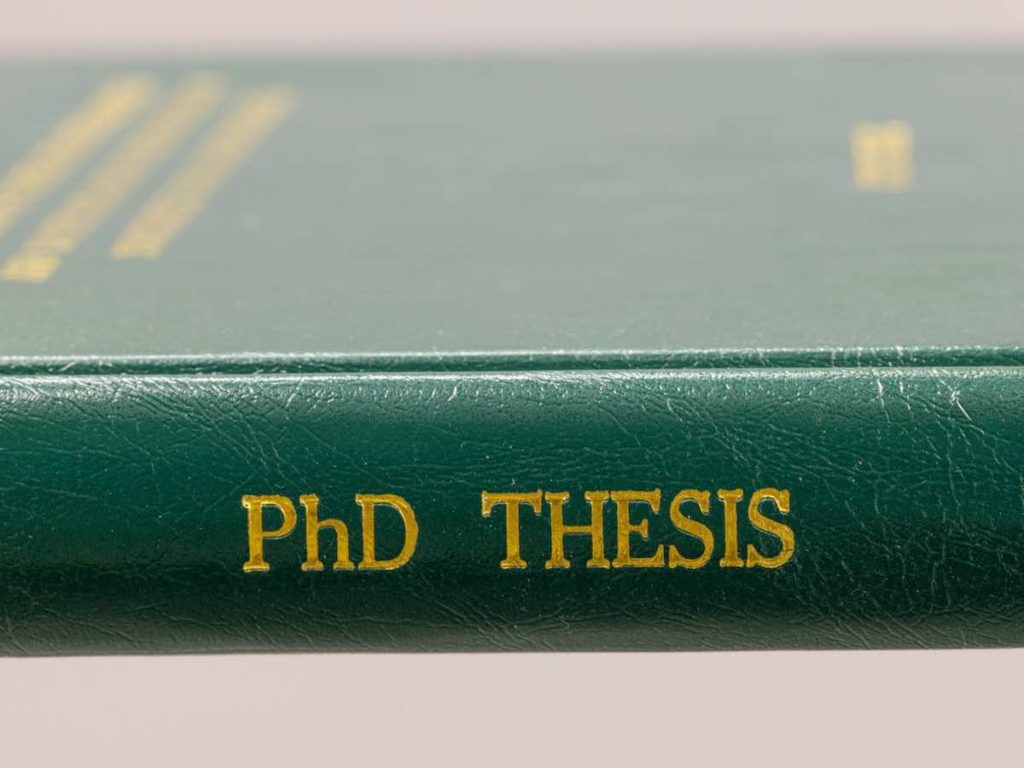
Naturally, some of the easiest PhDs are those without dissertations, which can take 1 to 2 years to write, not to mention that most PhD students spend a couple of years conducting research and reviewing literature.
The following are some examples of Ph.D. programs minus any dissertation:
- Adult and career education
- Business administration
- Criminal justice
- Educational administration
- Grief counseling
- Human resources
- Information technology
- Nursing practice
- Public administration
- Social work
But keep in mind that different universities may have different PhD completion requirements.
Of all the easiest PhD programs, the general consensus is that most can be found online. But if you are like some students who find online learning more difficult than traditional learning, earning one can still be hard.
What are the Hardest PhDs to Get?
Some PhD programs are longer to complete and involve a lot of complex coursework and other completion requirements, thus making them some of the hardest to earn. Just like among various bachelor’s degrees, some of the most challenging PhDs to earn include those in the STEM- and healthcare-related fields.
In most instances and for most students, a PhD is harder to earn than a master’s degree. And, needless to say, it’s so much harder to obtain than a bachelor’s degree.
But some PhDs are simply more challenging to get than other PhDs.
Just like what’s mentioned earlier, STEM PhD programs are some of the hardest. Many agree that the likes of pure mathematics, theoretical physics, aerospace engineering, chemical engineering and computer science can prove to be so taxing. The same is true for healthcare PhD programs such as pharmacy, nursing and optometry.
Are PhDs Expensive?
The cost of enrolling in a PhD program amounts to $28,000 to $40,000 per year. So, in other words, a full PhD can cost anywhere from $112,000 to $200,000 or up to $320,000 (8 years). Tuition and living expenses are the primary costs of a PhD. There are ways PhD students can get funding for their studies.
Other than time, a PhD can also take up lots of money. Certain factors can impact just how much you will have to spend to get your hands on a PhD, and some of them include the university, program and length of completion.
But did you know that many PhD students don’t have to pay full price?
Because of the steep cost, it’s not uncommon for those who are enrolled in PhD programs to fund their studies through things such as studentships, research council grants, postgraduate loans and employer funding. As a matter of fact, some of them do not pay for their PhD programs — they are, instead, paid to take them.
And just like what we talked about earlier, it’s very much possible for you to be a PhD student and an employee, whether part-time or full-time, at the same time in order to earn money and fund your postgraduate studies.
Is a PhD Worth It Financially?
Without careful planning, completing a PhD program can hurt one’s finances. And if the return on investment (ROI) isn’t that substantial, it can be a waste of resources, too. For many, however, earning a PhD to secure their dream jobs or follow their true callings makes all the financial and time investments worth it.
After discussing just how much a PhD costs, it’s time to talk about if investing in it financially is a good idea.
It’s no secret that, generally speaking, the higher the educational attainment, the higher the earnings. True enough, the median weekly earning of a PhD holder is $1,909.
Doing the math, that’s equivalent to about $99,268 per year. On the other hand, the median weekly earning of a master’s degree holder is $1,574 or $81,848 per year — that’s a difference of $17,420 per year. Please keep in mind that it’s not uncommon for some master’s degree holders to make more than PhD holders.
The difference, however, becomes substantial when the average salary of bachelor’s degree holders is taken into account: $1,334 per week or $69,368 per year, which is $29,882 lower than the annual salary of those with PhDs.
Let’s take a look at the estimated annual median earnings of some PhD holders in some disciplines:
- Engineering: $107,000
- Mathematics: $104,000
- Healthcare: $98,000
- Business: $94,000
- Social science: $90,000
- Physical science: $89,000
- Public policy: $84,000
- Agriculture: $83,000
- Social work: $78,000
- Architecture: $73,000
- Communications: $72,000
Are PhDs in Demand?
PhDs are especially in demand in areas where highly specialized and very high-level research skills are important. Some of the most sought-after PhDs are those in STEM- and healthcare-related fields such as information systems, environmental engineering, chemistry, nursing and physical therapy.
As a general rule of thumb, some of the hardest PhDs to earn tend to be the most in-demand, too.
Simply put, PhDs in disciplines required for a better understanding of currently existing knowledge and challenges, development of modern-day technologies and discovery of new life-changing stuff are highly employable.
And this is why industries such as scientific research and development, manufacturing, health and social work are on the lookout all the time for promising PhD holders. Areas where PhDs are also commonly required include the education sector as well as various segments of the business industry.
Numerous transferable skills learned and developed by students, many of which are appreciated by employers across various industries, also help those with PhDs have increased job market value.
Just Before You Get a PhD
Does getting a PhD still sound great after everything you have read above? Then the smartest step for you to take next is to find the right PhD program for you and apply to it.
But keep in mind that while there are many perks that come with being a PhD holder, there are some sacrifices you will have to make before you get your hands on the prestigious academic degree. But by working hard and staying committed, it won’t take long before you are one of the country’s highest-paid and most satisfied professionals!

I graduated with BA in Nursing and $36,000 in student loan debt from the UCF. After a decade in the workforce, I went back to school to obtain my MBA from UMGC.
Similar Posts

What is a Doctorate Degree?
Get the Reddit app
An online community for discussing issues related to academia, faculty life, research, and institutional structures. This is NOT the place to ask questions about your homework, your particular school or professors, or to get admission advice! Survey posts must be approved by mods in advance, must include contact/IRB info, and must be specific to academia.
Are part time PhDs a real thing?
I know they exist in some institutions, but any respectable place? What are the chances? Is it dictated by the university, or would it be up to the professor? Speaking from an Anglo-Western perspective, US, UK, Canada, AU/NZ
By continuing, you agree to our User Agreement and acknowledge that you understand the Privacy Policy .
Enter the 6-digit code from your authenticator app
You’ve set up two-factor authentication for this account.
Enter a 6-digit backup code
Create your username and password.
Reddit is anonymous, so your username is what you’ll go by here. Choose wisely—because once you get a name, you can’t change it.
Reset your password
Enter your email address or username and we’ll send you a link to reset your password
Check your inbox
An email with a link to reset your password was sent to the email address associated with your account
Choose a Reddit account to continue
We've detected unusual activity from your computer network
To continue, please click the box below to let us know you're not a robot.
Why did this happen?
Please make sure your browser supports JavaScript and cookies and that you are not blocking them from loading. For more information you can review our Terms of Service and Cookie Policy .
For inquiries related to this message please contact our support team and provide the reference ID below.
You can earn a bonus worth $1,000 in travel with Capital One Venture — for a limited time. Here’s what you need to know
Advertiser disclosure.
We are an independent, advertising-supported comparison service. Our goal is to help you make smarter financial decisions by providing you with interactive tools and financial calculators, publishing original and objective content, by enabling you to conduct research and compare information for free - so that you can make financial decisions with confidence.
Bankrate has partnerships with issuers including, but not limited to, American Express, Bank of America, Capital One, Chase, Citi and Discover.
- Share this article on Facebook Facebook
- Share this article on Twitter Twitter
- Share this article on LinkedIn Linkedin
- Share this article via email Email

- • Credit cards
- • Personal finance
- Connect with Ana Staples on LinkedIn Linkedin

- • General personal finance
- Connect with John Puterbaugh on LinkedIn Linkedin
The Bankrate promise
At Bankrate we strive to help you make smarter financial decisions. While we adhere to strict editorial integrity , this post may contain references to products from our partners. Here's an explanation for how we make money . The content on this page is accurate as of the posting date; however, some of the offers mentioned may have expired. Terms apply to the offers listed on this page. Any opinions, analyses, reviews or recommendations expressed in this article are those of the author’s alone, and have not been reviewed, approved or otherwise endorsed by any card issuer.
At Bankrate, we have a mission to demystify the credit cards industry — regardless or where you are in your journey — and make it one you can navigate with confidence. Our team is full of a diverse range of experts from credit card pros to data analysts and, most importantly, people who shop for credit cards just like you. With this combination of expertise and perspectives, we keep close tabs on the credit card industry year-round to:
- Meet you wherever you are in your credit card journey to guide your information search and help you understand your options.
- Consistently provide up-to-date, reliable market information so you're well-equipped to make confident decisions.
- Reduce industry jargon so you get the clearest form of information possible, so you can make the right decision for you.
At Bankrate, we focus on the points consumers care about most: rewards, welcome offers and bonuses, APR, and overall customer experience. Any issuers discussed on our site are vetted based on the value they provide to consumers at each of these levels. At each step of the way, we fact-check ourselves to prioritize accuracy so we can continue to be here for your every next.
Editorial integrity
Bankrate follows a strict editorial policy , so you can trust that we’re putting your interests first. Our award-winning editors and reporters create honest and accurate content to help you make the right financial decisions.
Key Principles
We value your trust. Our mission is to provide readers with accurate and unbiased information, and we have editorial standards in place to ensure that happens. Our editors and reporters thoroughly fact-check editorial content to ensure the information you’re reading is accurate. We maintain a firewall between our advertisers and our editorial team. Our editorial team does not receive direct compensation from our advertisers.
Editorial Independence
Bankrate’s editorial team writes on behalf of YOU – the reader. Our goal is to give you the best advice to help you make smart personal finance decisions. We follow strict guidelines to ensure that our editorial content is not influenced by advertisers. Our editorial team receives no direct compensation from advertisers, and our content is thoroughly fact-checked to ensure accuracy. So, whether you’re reading an article or a review, you can trust that you’re getting credible and dependable information.
How we make money
You have money questions. Bankrate has answers. Our experts have been helping you master your money for over four decades. We continually strive to provide consumers with the expert advice and tools needed to succeed throughout life’s financial journey.
Bankrate follows a strict editorial policy , so you can trust that our content is honest and accurate. Our award-winning editors and reporters create honest and accurate content to help you make the right financial decisions. The content created by our editorial staff is objective, factual, and not influenced by our advertisers.
We’re transparent about how we are able to bring quality content, competitive rates, and useful tools to you by explaining how we make money.
Bankrate.com is an independent, advertising-supported publisher and comparison service. We are compensated in exchange for placement of sponsored products and services, or by you clicking on certain links posted on our site. Therefore, this compensation may impact how, where and in what order products appear within listing categories, except where prohibited by law for our mortgage, home equity and other home lending products. Other factors, such as our own proprietary website rules and whether a product is offered in your area or at your self-selected credit score range, can also impact how and where products appear on this site. While we strive to provide a wide range of offers, Bankrate does not include information about every financial or credit product or service.
Summer is upon us. As you’re looking forward to your vacation, it might be a good time to start earning rewards to fund your next one.
The Capital One Venture Rewards Credit Card can help with that. For a limited time, it offers an introductory bonus worth $1,000 in travel. For a mid-tier travel credit card charging $95 in annual fees, that’s pretty generous. Plus, the card provides solid long-term value too, thanks to its statement credit perks and double rewards on all purchases.
The issuer currently doesn’t provide an end date for this offer. If you’re interested in travel rewards, it might be wise to hurry — or not, depending on whether the Venture is a good card for you to begin with. Here’s how to determine that, as well as everything else you need to know about the new bonus offer.
What you need to know about the new Capital One Venture bonus offer
As with its previous offer, the Capital One Venture Rewards Credit Card gives you 75,000 miles ($750 when redeemed for travel) once you spend $4,000 on purchases within the first three months of account opening. But on top of that, you’ll also receive a one-time $250 Capital One Travel credit in your first cardholder year. That’s a total of $1,000 worth of travel in first-year value.
To earn the bonus 75,000 miles, you’ll need to spend about $1,333 monthly in the first three months. That may seem like a hefty spend requirement, but it’s in line with intro bonuses on other similar cards. For instance, the Chase Sapphire Preferred® Card also charges a $95 annual fee and offers 60,000 bonus points after you spend $4,000 on purchases in the first three months with the card. The bonus is worth $750 when you redeem it through Chase Travel℠.
The $250 travel credit, however, isn’t something you can commonly find on cards of this rank. There’s no spend requirement to meet — it’s a bonus you get for simply being a cardholder. This will give you a taste of what luxury credit cards typically provide. For example, the Capital One Venture X Rewards Credit Card offers an annual $300 Capital One Travel credit, but it also charges an annual fee of $395.
Should you take advantage of the new bonus offer?
The Capital One Venture is Bankrate’s best travel card for flat-rate rewards. It earns 5X miles on hotels and rental cars booked through Capital One Travel and and 2X miles on all other purchases. You can use your rewards to book travel through the issuer’s portal, cover recent travel purchases or transfer miles to Capital One’s travel partners (potentially at a higher value).
Cardholders also receive up to a $100 credit for Global Entry or TSA PreCheck , two government programs allowing for faster airport security screening. Another perk is a $50 experience credit when you book a hotel through Capital One’s Lifestyle Collection.
For $95 per year, this is a solid offer. And the $1,000 in value you can get with the current limited-time bonus offsets the annual fee 10 times over. You could say the card pays for itself for a whole decade.
Still, you want to make sure the Capital One Venture is the right choice for you before you submit your card application. For instance, the card may be worth it if:
- You’re an occasional traveler. If you don’t travel enough to justify a triple-digit annual fee, the Capital One Venture can be a great alternative to more premium travel cards.
- You prefer simplicity. All your purchases will earn at least 2X miles per dollar. You’ll get the same 1-cent-per-point value whether you book travel through the issuer’s portal or a third-party site. For those who value simple and flexible travel rewards, it doesn’t get better than that.
- You maximize rewards. If you’re all about getting the most out of your credit cards but have no flat-rate rewards card yet, the Capital One Venture can take that spot. This way, you’ll always earn more than 1 cent per dollar on your purchases.
On the other hand, you might want to skip the shiny new offer if:
- The spend requirement would be too challenging for your budget. Avoid spending just for the sake of earning rewards. The right offer for you shouldn’t impact your spending habits.
- You want to redeem rewards outside of travel. While Capital One gives you such redemption options, your miles might lose a lot of their value. For example, redeeming for cash back only gets you 0.5 cents per mile.
- You prefer to transfer credit card rewards. Capital One has transfer partners, but you might get a better deal with a different issuer. According to Bankrate valuations , American Express Membership Rewards and Ultimate Chase Rewards points have an estimated value of 2 cents per point. To compare, we value Capital One miles at 1.7 cents per mile.
The bottom line
If the Capital One Venture looks like a good fit for you, now might be the perfect time to apply. The limited-time intro offer is generous, and you get a portion of it just for being a cardholder. Make sure to learn more about the card’s benefits before you send your application — it’s always best to make a fully informed decision.

Related Articles

Capital One Venture X benefits guide

Capital One Venture Card benefits guide

Southwest Rapid Rewards Plus vs. Capital One Venture Rewards

Capital One Venture vs. Capital One VentureOne Rewards Credit Card
Who is the director of the Secret Service? Kimberly Cheatle has led agency since 2022
A House Republican leader is planning for an oversight hearing with the U.S. Secret Service after President Donald Trump was shot in the ear at a campaign rally in Pennsylvania on Saturday evening.
Sunday morning the FBI identified Thomas Matthew Crooks as the gunman who opened fire at Trump's rally . The Secret Service reported that the shooter and one rally attendee are dead. Two spectators are critically injured following the shooting.
House Committee on Oversight and Accountability Chairman James Comer, R-Kentucky, made the request for a briefing with the Secret Service and said he would call Kimberly Cheatle, the agency's director, to testify at a hearing.
"My prayers are with President Trump and the victims of the assassination attempt at today’s rally in Pennsylvania. I thank the brave Secret Service members who put their lives at risk to protect President Trump and for the American patriots in the audience who helped innocent victims," Comer said in a news release Saturday. "Political violence in all forms is unamerican and unacceptable. There are many questions and Americans demand answers. I have already contacted the Secret Service for a briefing and am also calling on Secret Service Director Kimberly Cheatle to appear for a hearing. The Oversight Committee will send a formal invitation soon.”
So who is Kimberly Cheatle?
Who is in charge of the Secret Service?
Kimberly Cheatle was sworn in as the 27th director of the U.S. Secret Service in September 2022. She was selected by President Joe Biden in August 2022.
Cheatle has served more than 25 years with distinction for the United States Secret Service across a number of leadership roles. She worked on the Vice Presidential Protective Division, and in 2021, Biden awarded Cheatle with a Presidential Rank Award.
What does the director of the Secret Service do?
In Cheatle's role as director of the U.S. Secret Service, she is in charge of executing protection and investigations for the agency.
The workforce is composed of multiple divisions within the Secret Service including Special Agents, Uniformed Division Officers, Technical Law Enforcement Officers and Administrative, Professional and Technical personnel, according to the Secret Service's website .
What did Kimberly Cheatle do before the Secret Service?
Prior to becoming the Secret Service director, Cheatle worked for PepsiCo as the senior director in Global Security, according to her biography with the Secret Service . There, Cheatle oversaw and directed security protocols for the company's facilities in North America.
Cheatle was the agency's assistant director of the Office of Protective Details, prior to joining PepsiCo. She also served as the Special Agent in Charge of the Secret Service's Atlanta Field Office. In that position, she provided oversight for all missions related to investigation, protective intelligence and protective visits in the state of Georgia.
When will the director of the Secret Service testify?
🚨BREAKING🚨 @RepJamesComer has invited U.S. Secret Service Director Kimberly Cheatle to testify at a hearing on Monday, July 22. Americans demand answers about the assassination attempt of President Trump. pic.twitter.com/zKia2oIxCf — Oversight Committee (@GOPoversight) July 14, 2024
The hearing is expected to take place July 22, 2024, according to a letter from the Committee on Oversight and Accountability.
When was the Secret Service created?
Established in 1865, the U.S. Secret Service is one of the country's oldest federal law enforcement agencies. The U.S. Secret Service Uniformed Division protects the White House Complex and Naval Observatory, according to the Secret Service's website .
One of the newest expansions of the Secret Service's protective missions includes the issuance of Presidential Decision Directives. This established the agency as the lead for coordinating the development and implementation of security plans for National Special Security Events. This covers presidential inaugurations, State of the Union Addresses and other events of national significance.
Kate Kealey is a general assignment reporter for the Des Moines Register. Reach her at [email protected] or follow her on Twitter at @ Kkealey17 .
Advertisement
What to Know About Kimberly Cheatle, the Secret Service Director
She has spent more than 20 years with the agency and provided security for President Bill Clinton, Vice President Dick Cheney and other leaders.
- Share full article

By Tim Balk
- Published July 18, 2024 Updated July 23, 2024, 2:44 a.m. ET
Kimberly A. Cheatle, the Secret Service director who has come under intense scrutiny after the assassination attempt against former President Donald J. Trump, is an agency veteran who helped protect President Bill Clinton and Vice President Dick Cheney.
Ms. Cheatle joined the Secret Service in 1995 and spent more than two decades there before leaving in 2021 to lead the North American security operations for PepsiCo. She returned to the agency in 2022 after President Biden asked her to serve as its director .
In her 22 months as director, the ranks of the Secret Service have grown, prompting claims from some employees that a focus on hiring more people with diverse backgrounds has hampered the agency.
Ms. Cheatle, 53, is the second woman to lead the Secret Service. Former colleagues have described her as capable and career-focused.
While working for PepsiCo, she told Security Magazine that she enjoyed doing home renovations in her spare time. “Burnout is real,” she told the magazine. “This industry can be difficult, and it’s important to discover yourself.”
Growing up in Illinois, Ms. Cheatle studied at a Catholic high school in Danville, Ill., about 130 miles south of Chicago, and at Eastern Illinois University, which she graduated from in 1992.
We are having trouble retrieving the article content.
Please enable JavaScript in your browser settings.
Thank you for your patience while we verify access. If you are in Reader mode please exit and log into your Times account, or subscribe for all of The Times.
Thank you for your patience while we verify access.
Already a subscriber? Log in .
Want all of The Times? Subscribe .

COMMENTS
A part-time PhD? Yes, it can be done and it can be incredibly rewarding writes, Arthur Krebbers. I've experienced many unexpected hurdles while doing my PhD part-time and I'm sure that you will too. It is often difficult to keep your spirits high while doing a part-time PhD but the reward is substantial.
The cons: The chance of it not being possible: It is longer: Life can be disruptive: The fear of missing out: The takeaway: Study PhD without leaving your job. Yes, you can pursue a PhD program part-time while working. A part-time PhD contains all the attributes and components of traditional PhD programs but comes with a flexible schedule.
Master Academia. 11 minutes read. Doing a PhD part-time can be an attractive option for many reasons. However, part-time PhDs are less common than full-time ones, and there tends to be a lack of information on this option. This guide to part-time PhDs answers the most common questions that prospective part-time PhD candidates have. Contents.
Is it worth doing a part-time PhD? Undertaking a part-time PhD can benefit individuals seeking to balance work, family, and education commitments. It allows flexibility to continue working while pursuing advanced studies, which can lead to career advancement and personal fulfillment. Part-time PhD programs offer opportunities for professional ...
The average tuition fee for part time PhD study in the UK is approximately £2,356 per academic year for home students, and between £8,000 to £12,500 for international students. This is typically 50% of the fee charged for an equivalent full time doctorate. However, a handful of universities use a prorated fee of up to 60% so it's important ...
The main difference between part-time PhDs and full-time study is the length of the course. By the end of the PhD you will have completed the same amount of work and produced a full length thesis.. While most students in our Pulse survey data are interested in full-time PhDs, those in the upper age groups (45+ years) are more likely to consider part-time (37% versus 15% between 18-44 year olds).
By Jamie Foster November 5, 2023. Earning a PhD is the pinnacle of academic achievement in computer science, opening doors to research, teaching, and leadership roles. But taking 4+ years off work for a full-time program isn't feasible for everyone. Part-time PhD options allow professionals to attain this goal while continuing their careers.
A part-time PhD is basically about flexibility. This means that : The rules about timelines for submission do not apply to you. Time for completion may be open-ended, sometimes as long as 8 years. The fees may be lower than for the full-time programme. Your presence may not be required.
Yes, part time PhD programs do exist. Universities know that many people have packed schedules. To accommodate busy students, some schools give the option of part-time enrollment in PhD programs online or on-campus.. The idea is that you may work your way through one of these programs while still living at home and holding a regular job — no uprooting your life required.
A full-time PhD typically spans 3 to 5 years, depending on the field of study and institution. In contrast, part-time PhDs can extend up to 7 or even 10 years. This is because they are more flexible, catering to part-time students by allowing extended timelines for dissertation completion.
The biggest takeaway about part-time PhD programs is that they're highly variable, especially when it comes to completion times. A Part-Time PhD Program Might be Right for You If… Many students can benefit from the flexibility offered by a part-time PhD program. You might be the perfect candidate if you: Work; Have a family
Is it really worth doing a PhD and getting a doctorate? We've looked at careers and employment prospects as well as the skills you'll gain. ... Part-time employment: 9%: 9%: Employment and further study: 8%: 10%: Further study: 3%: 4%: Other: 4%: 5%: Information in this table is based on data derived from the 2021-22 Graduate Outcomes survey ...
The difference is the time given to both. As the name suggests, a part-time PhD is a PhD that is studied only part-time, while a full-time PhD is studied in the usual manner. A part-time PhD typically takes anywhere between five and seven years. Full-time PhDs are, by no means, short affairs, but typically tend to take around three or four years.
In 2020, universities purged around 10% of their workforce due to the pandemic, and many university careers are still vulnerable. Given these statistics, you might wonder if doing a PhD is still a ...
Measuring worth in a purely financial and employment point of view, PhDs have better outcomes than masters or first-degree graduates. Across the UK, 95 per cent of PhDs 15 months after leaving ...
Part time PhD programmes also worth looking at for PhD candidates, as they allow researchers to work during their PhD course who can then spend their earnings towards their living costs and tuition fees. Conclusion. In analysing the career prospects and transferable skills gained in undertaking a PhD degree, it is clear that pursuing a PhD is ...
In terms of nuts and bolts of building career experience section on a resume, which is often the most important part, a PhD is rarely worth it. (Some STEM careers do require a PhD.) However, at the start of my post-graduate educational journey, I was working part-time running teen programs and full time as a landscaper. I had an undergraduate ...
November 17, 2022. 10184. PhD programs that are offered full-time or part-time have many differences. The duration of time needed for each program is the most noticeable difference. While a part-time PhD program might take anywhere from six to eight years to finish, a full-time PhD program normally requires four to five years of full-time study.
But keep in mind that some PhD part time programmes will not be eligible for financial aid or funding, at which point part time study may no longer be personally worth it. 2. Know Your Job. If your work is related to your field of study and your employers understand and support the requirements of your PhD, you will have a much less stressful ...
I'm doing a part time PhD. I already hold a senior clinical role in direct patient care. The PhD is directly related to my field by teaching me how to better understand and, ultimately, contribute to to evidence base. Pros: I don't have to be broke during my PhD or stress about never getting a job.
Expect to be poor for a long time. As a Chem E it may not be worth it since you can start at 70k a year asap Reply reply ... I'm a full time senior software engineer doing a part-time phd. From my school's POV I'm doing it approx. 50% of my time: minimum 6 years, the normal full time phd milestones just spaced out doubled over the ...
Many working PhD students teach undergraduates at their respective universities. Some are full-time PhD students with part-time work, while others are part-time PhD students with full-time work. ... Is a PhD Worth It Financially? Without careful planning, completing a PhD program can hurt one's finances. And if the return on investment (ROI ...
All Australian universities offer part-time, but there can be an attitude against part-timers because universities don't want you to do anything other than concentrate on your PhD. Part-timers ineligible for scholarships unless you have a medical condition. It's a classist and ableist attitude too. 7. Reply.
Vice President Kamala Harris is now the obvious heir as the Democratic nominee following President Joe Biden's announcement that he would not seek reelection. Harris's ascent is a remarkable ...
For a limited time, it offers an introductory bonus worth $1,000 in travel. For a mid-tier travel credit card charging $95 in annual fees, that's pretty generous.
A House Republican leader is planning for an oversight hearing with the U.S. Secret Service after President Donald Trump was shot in the ear at a campaign rally in Pennsylvania on Saturday evening ...
The agency's primary job is to provide security for the nation's leaders, including current and former presidents. On Sept. 11, 2001, Ms. Cheatle was part of a team that led Mr. Cheney from ...
The global computer outage affecting airports, banks and other businesses on Friday appears to stem at least partly from a software update issued by major US cybersecurity firm CrowdStrike ...